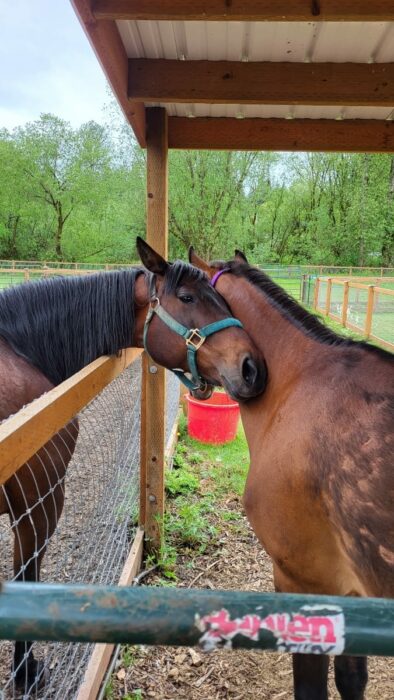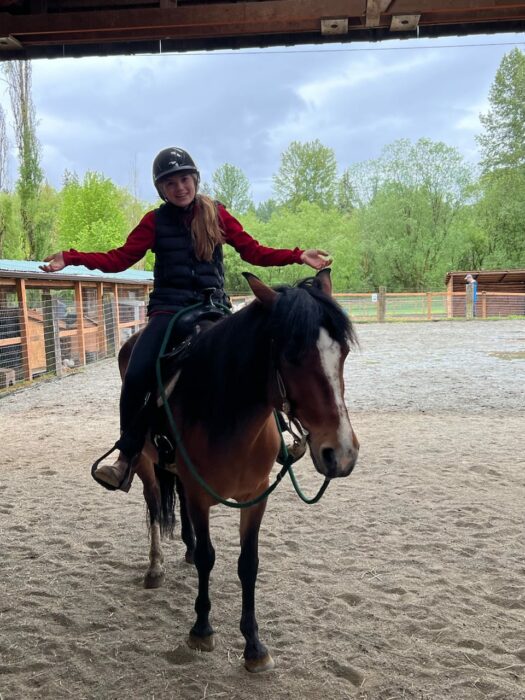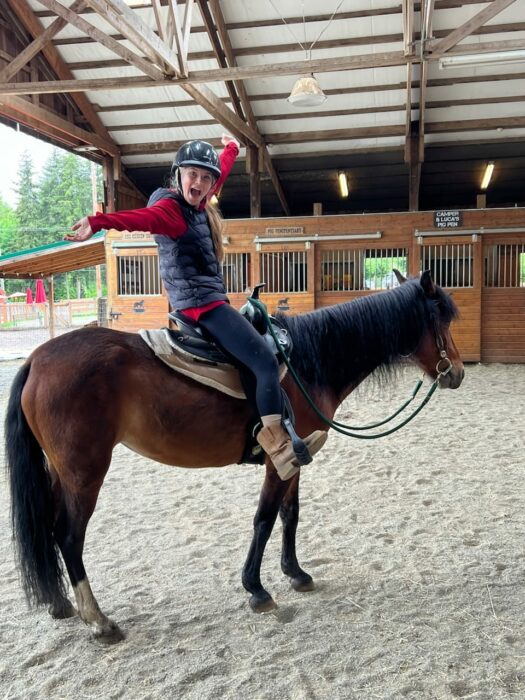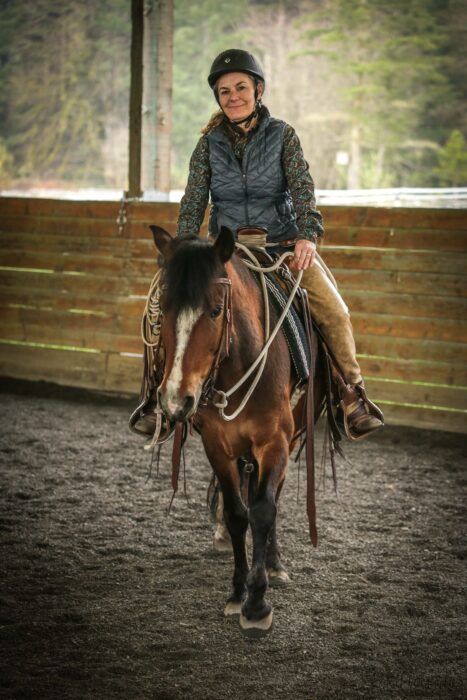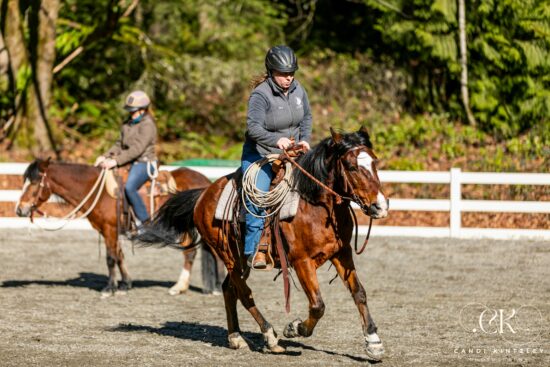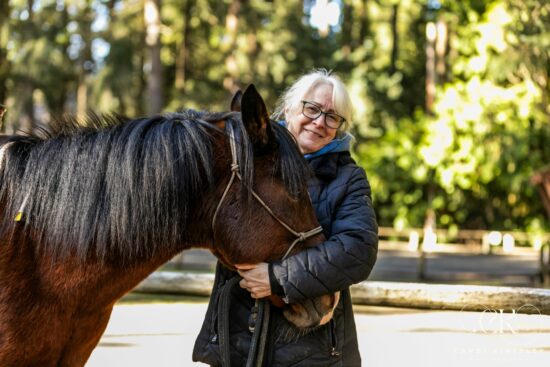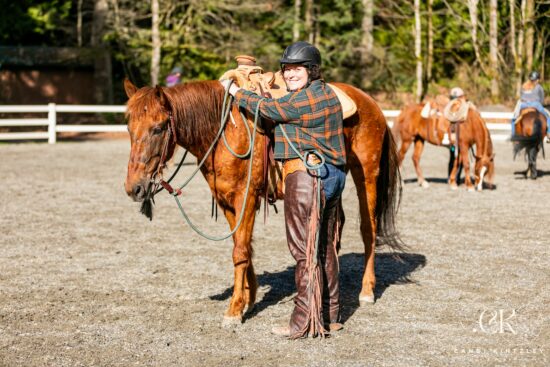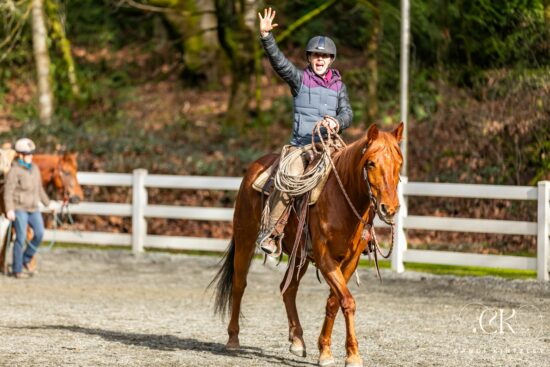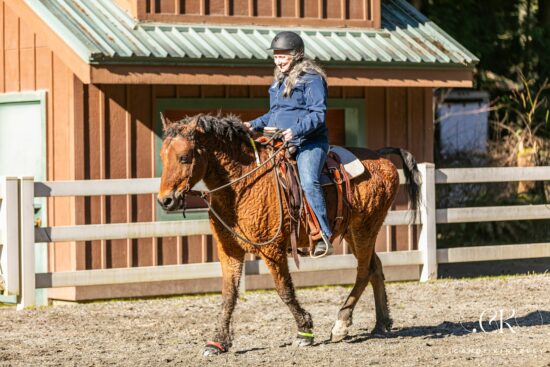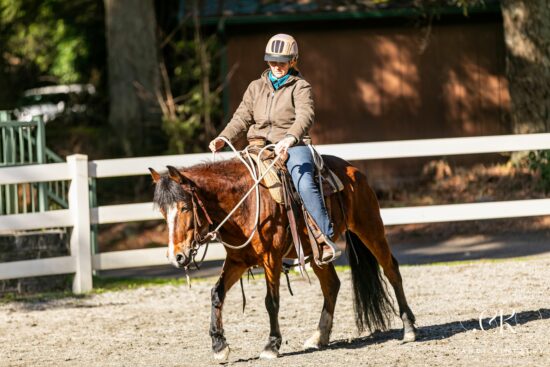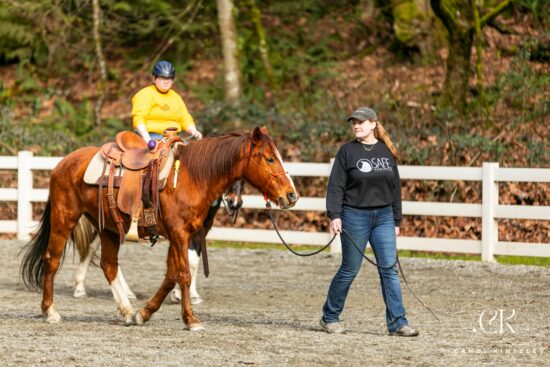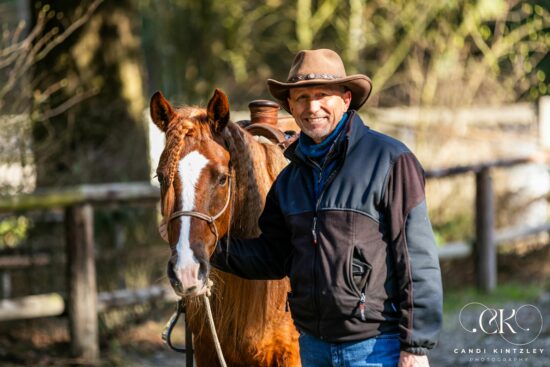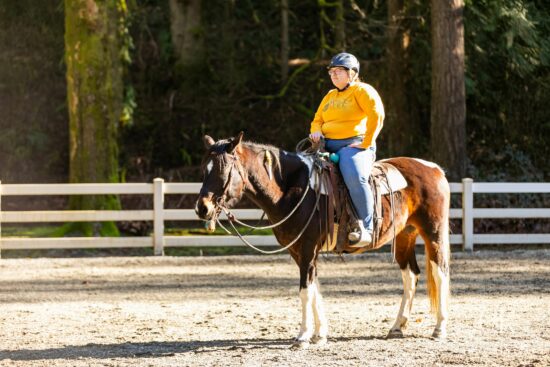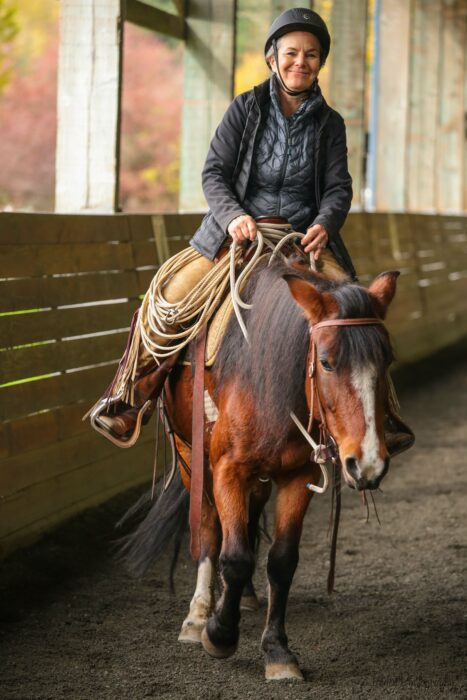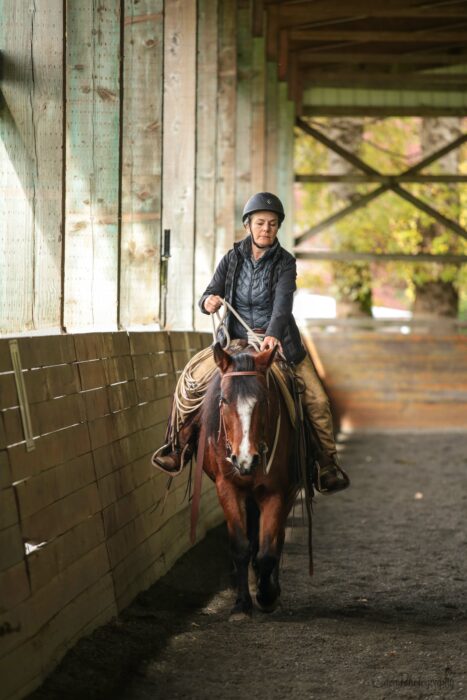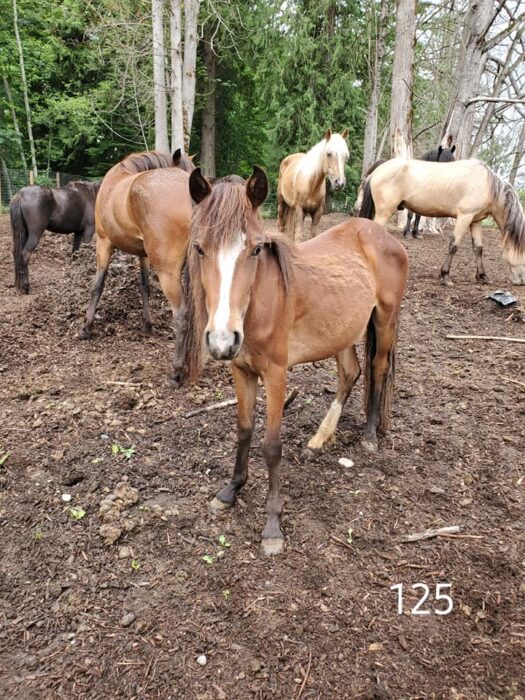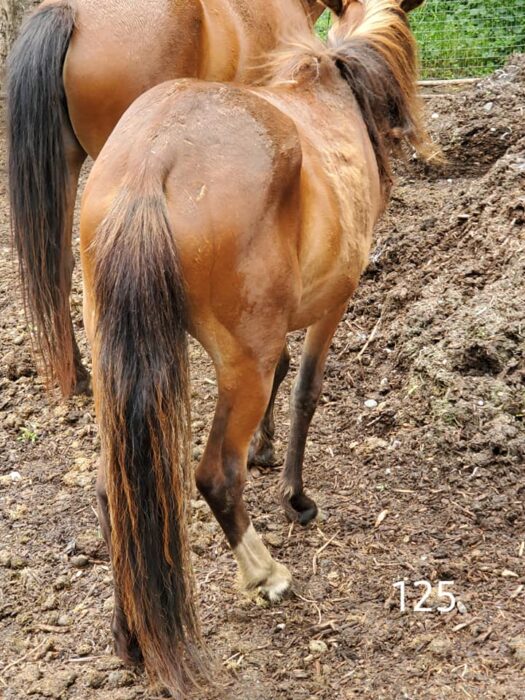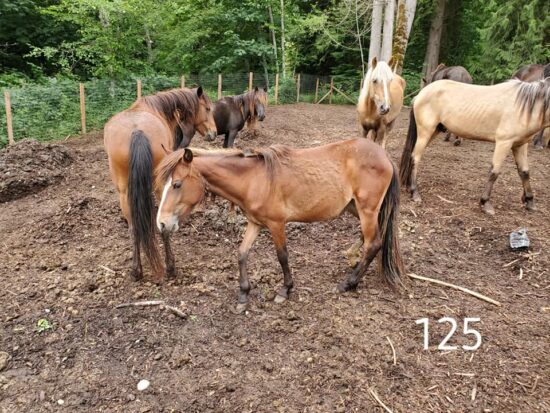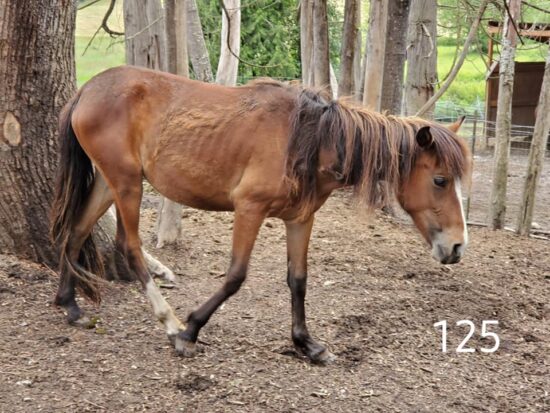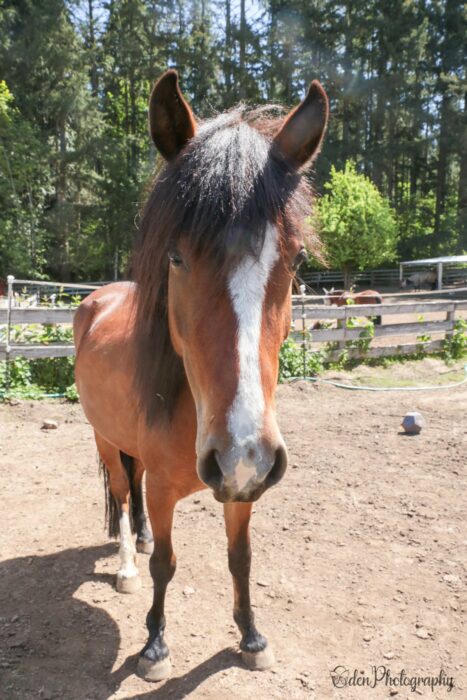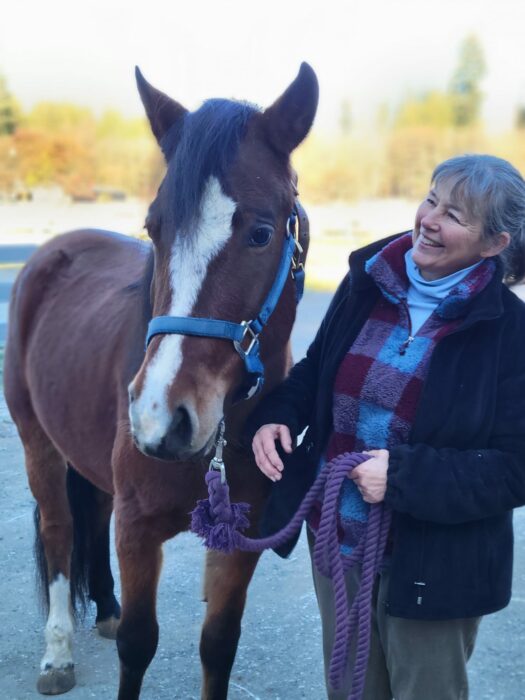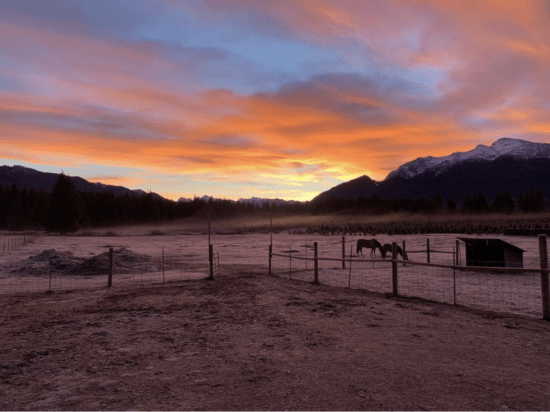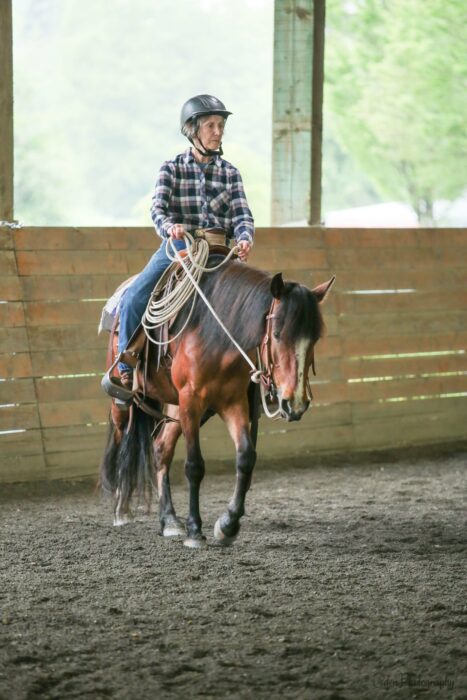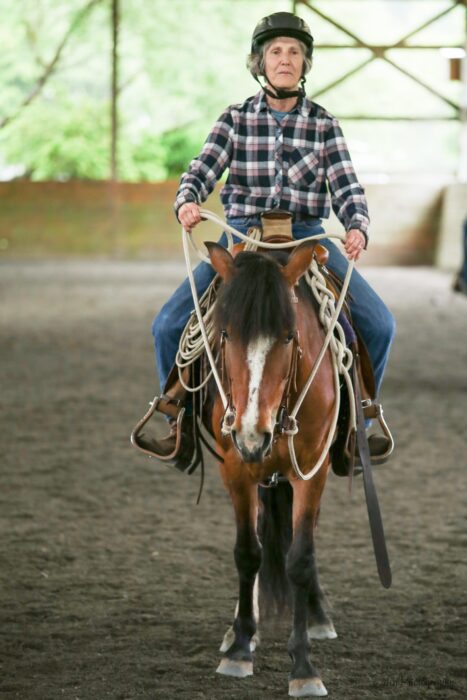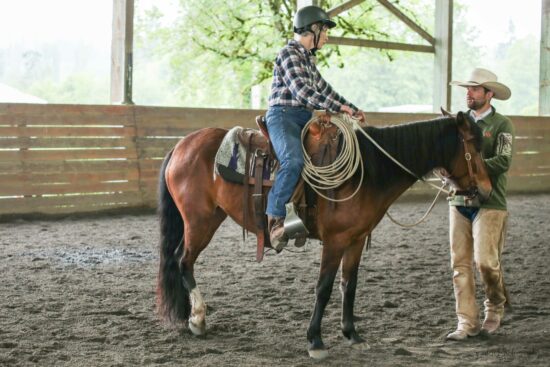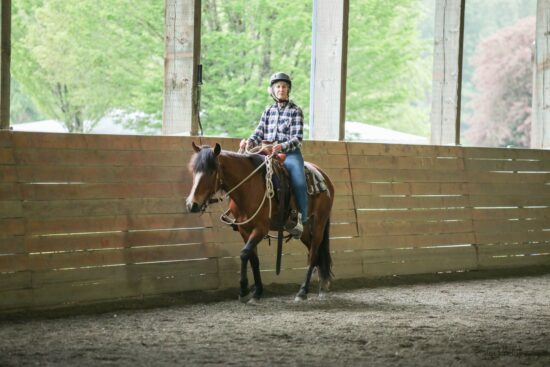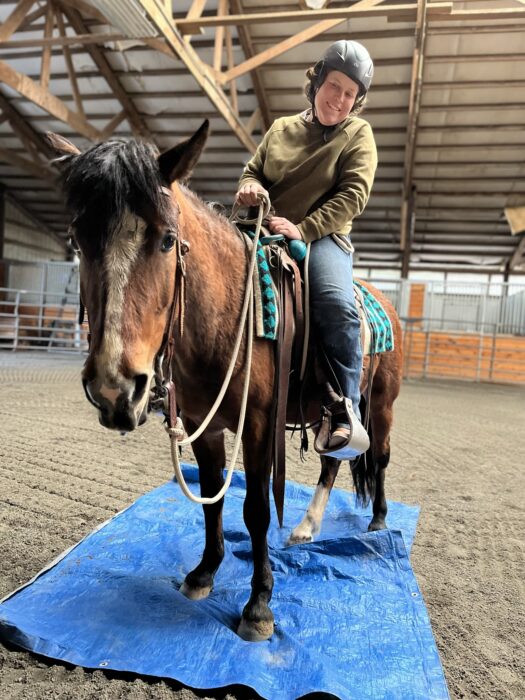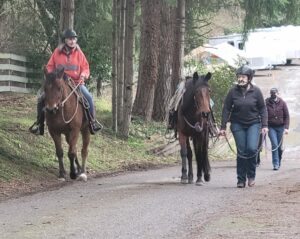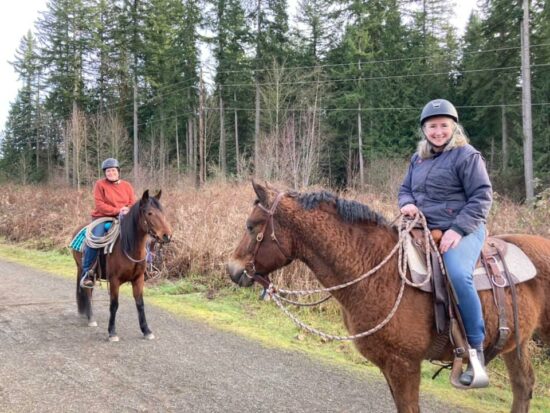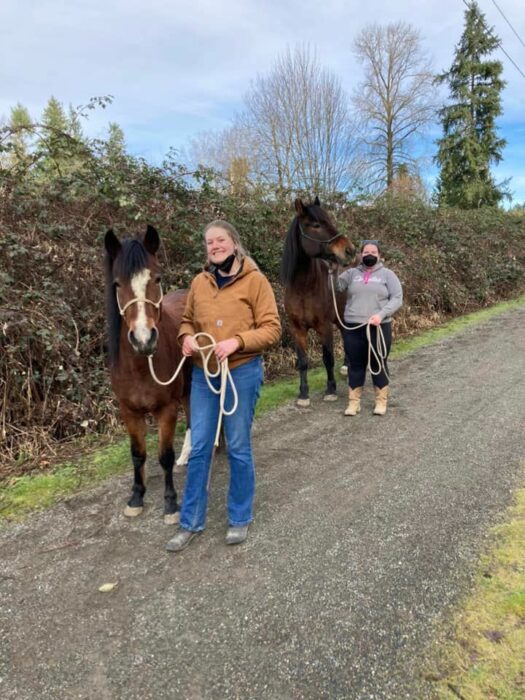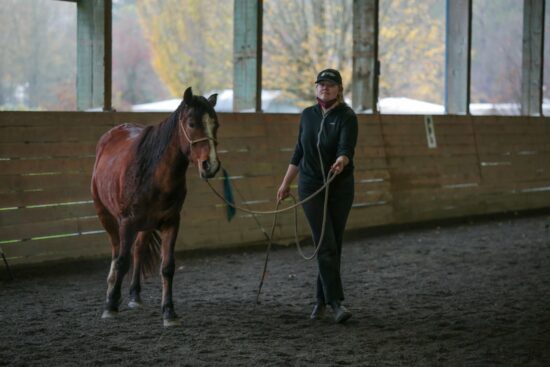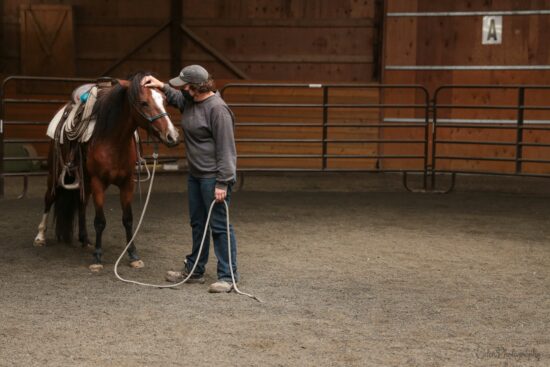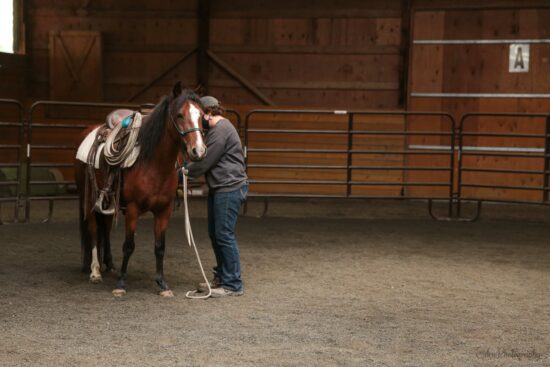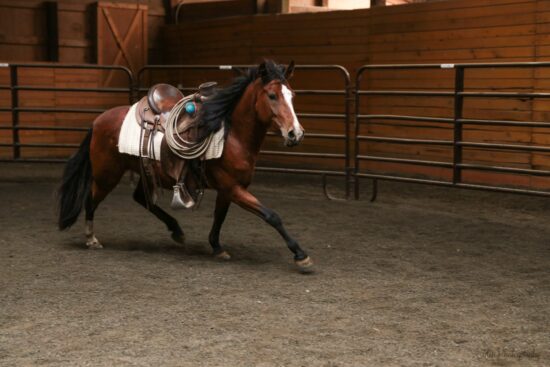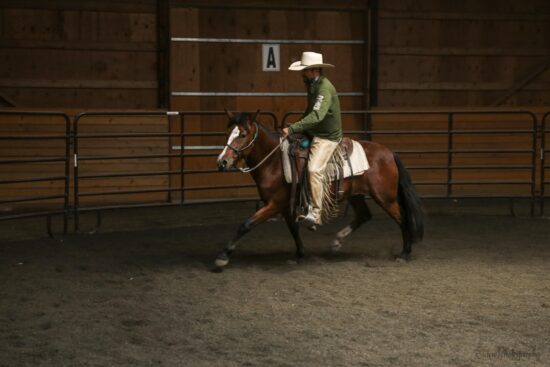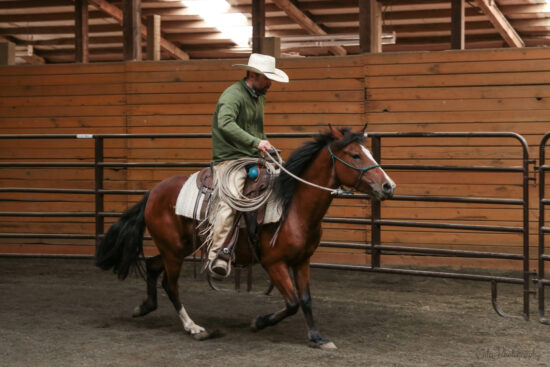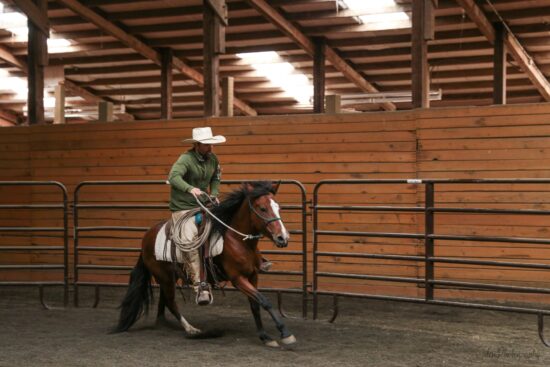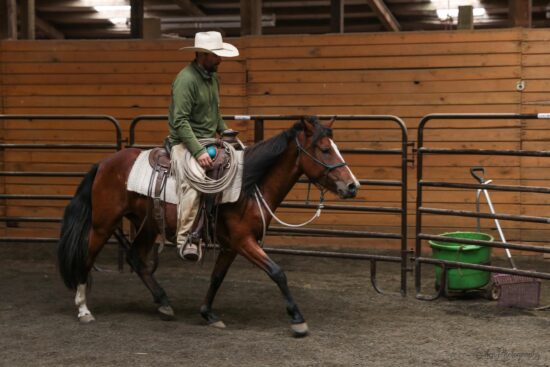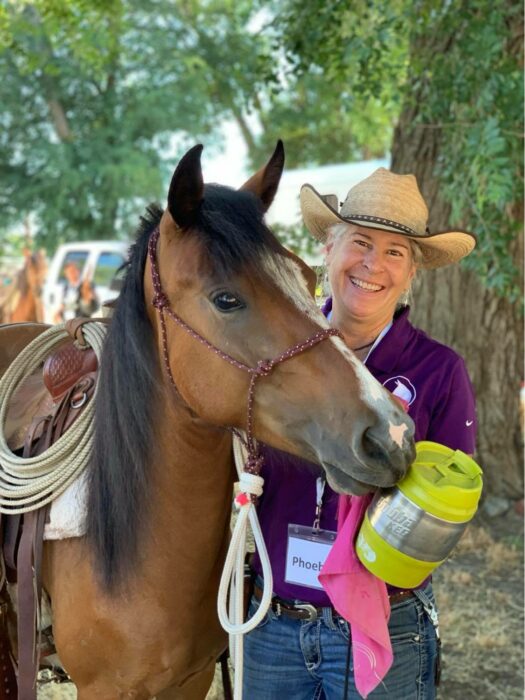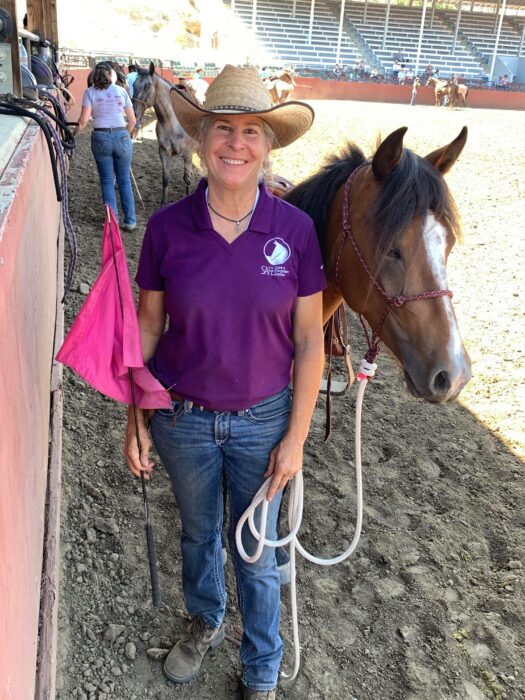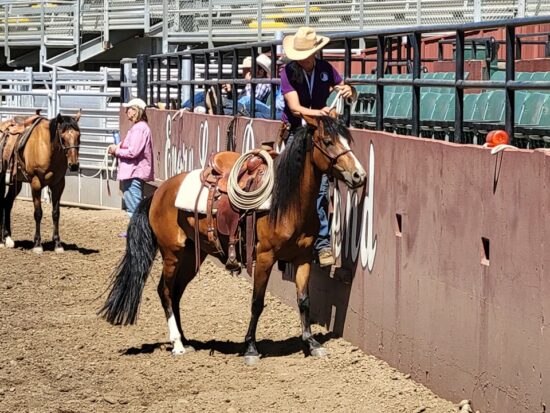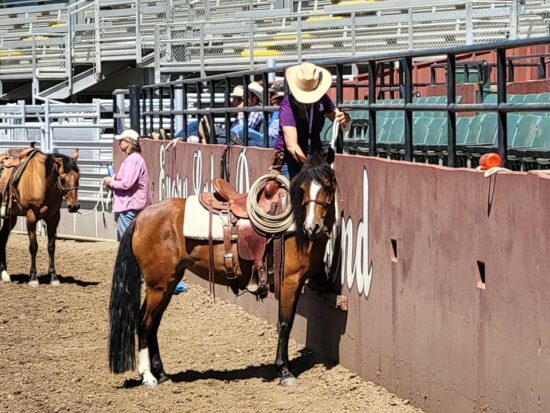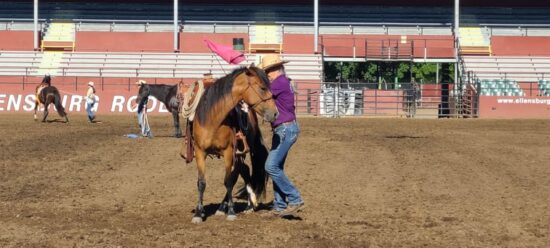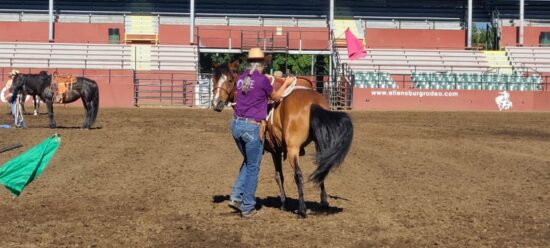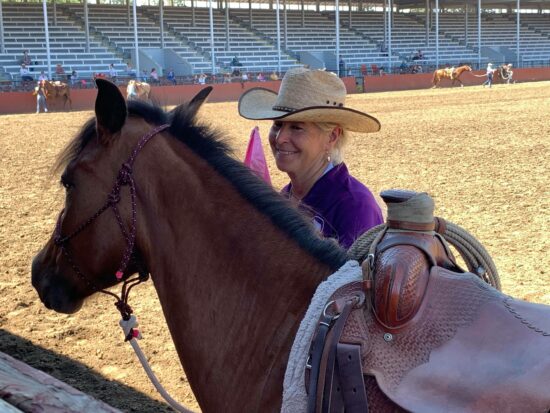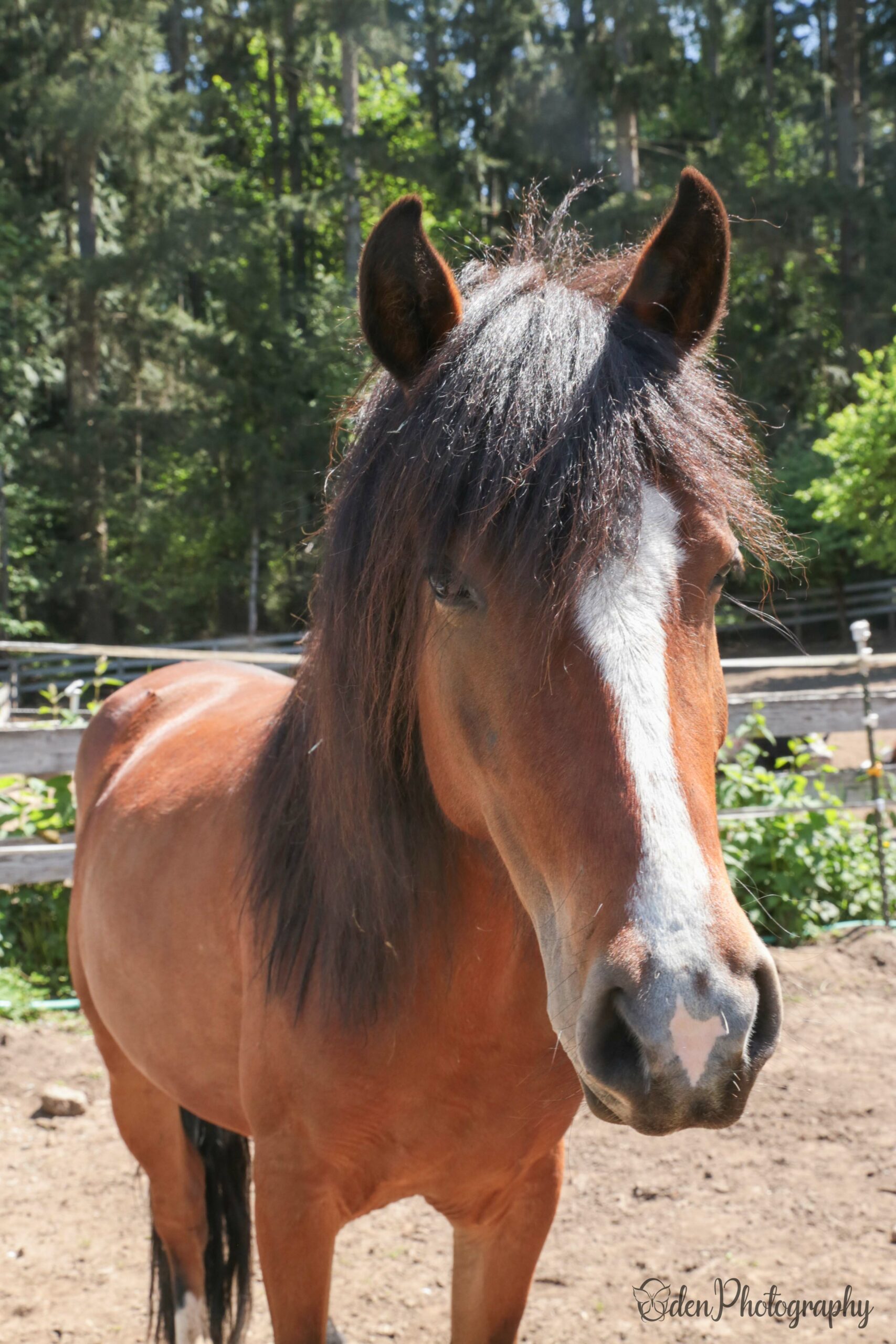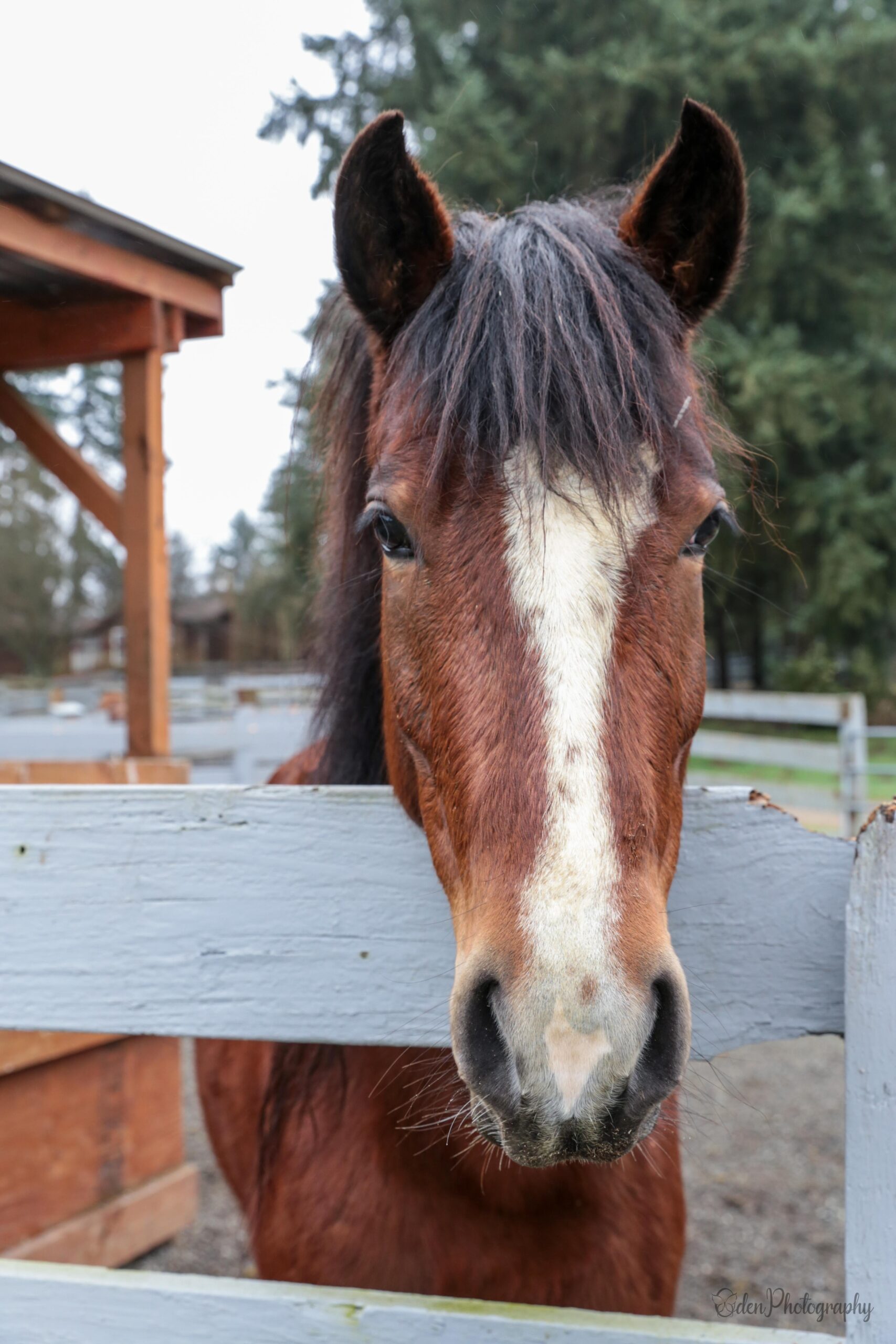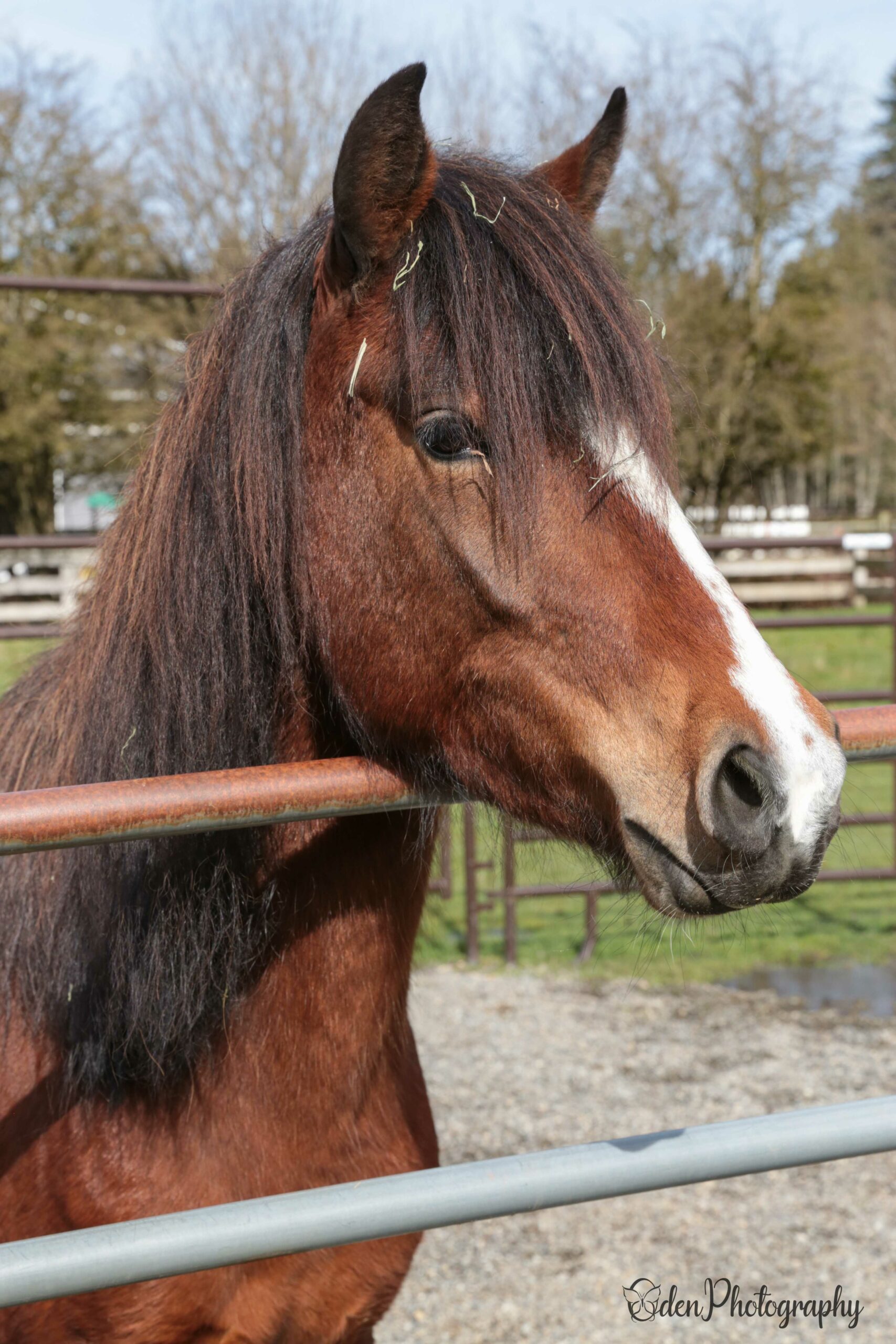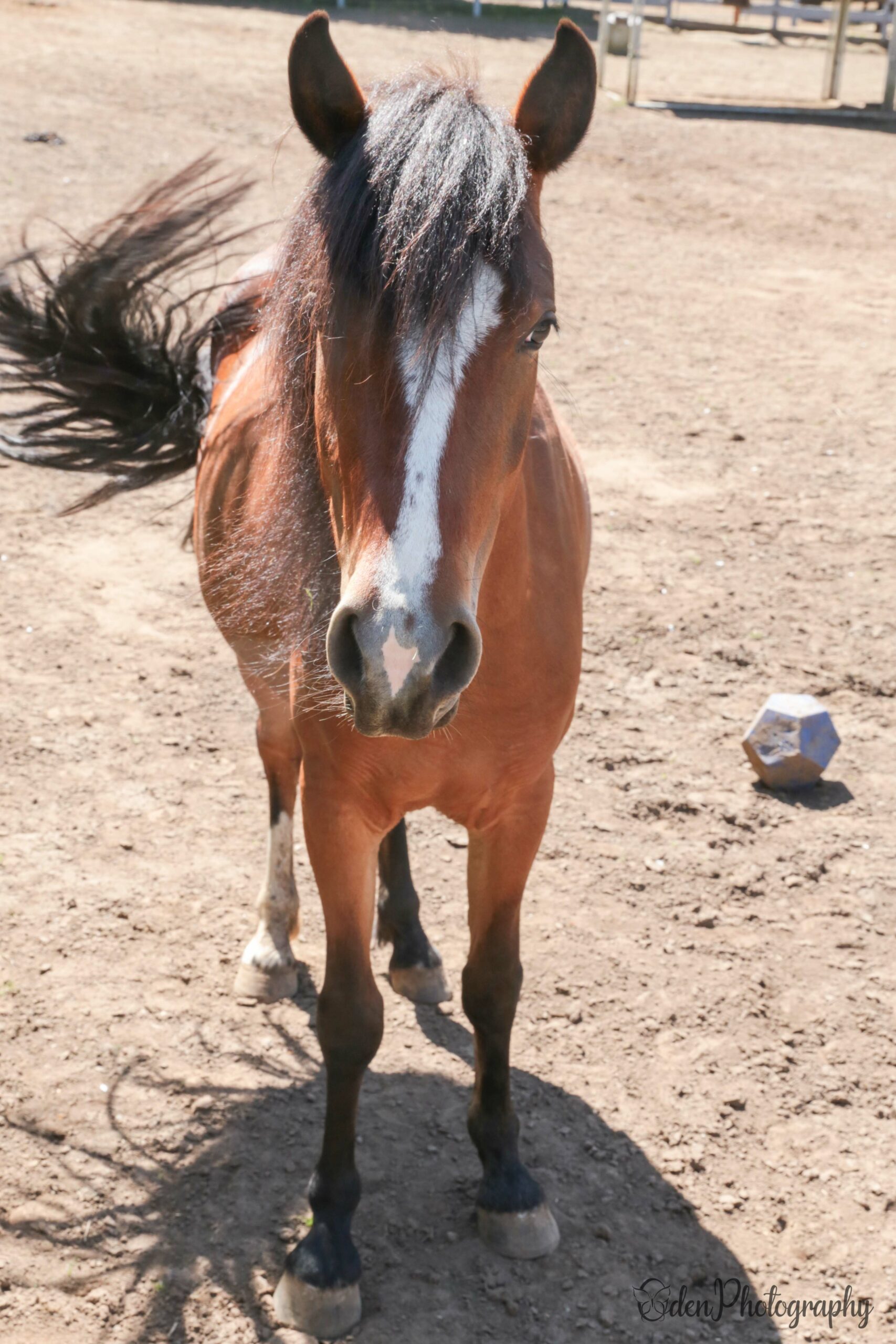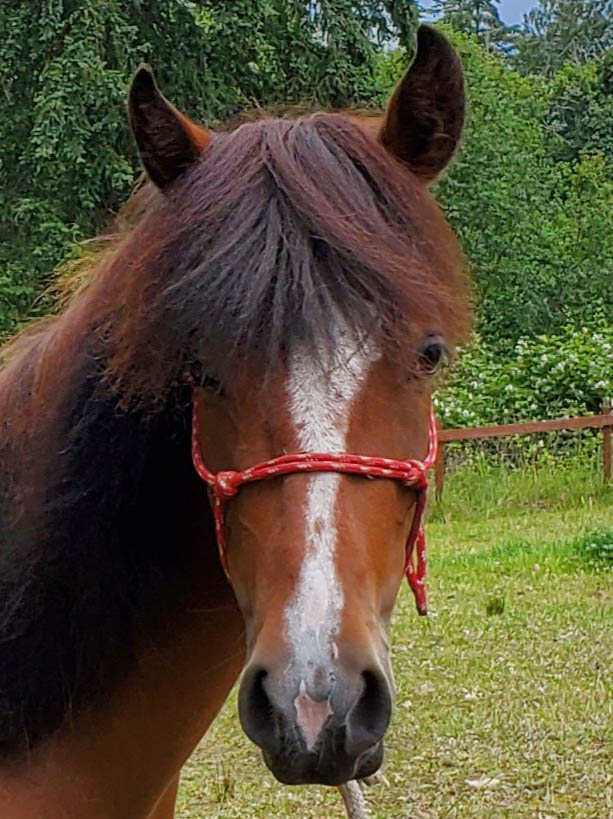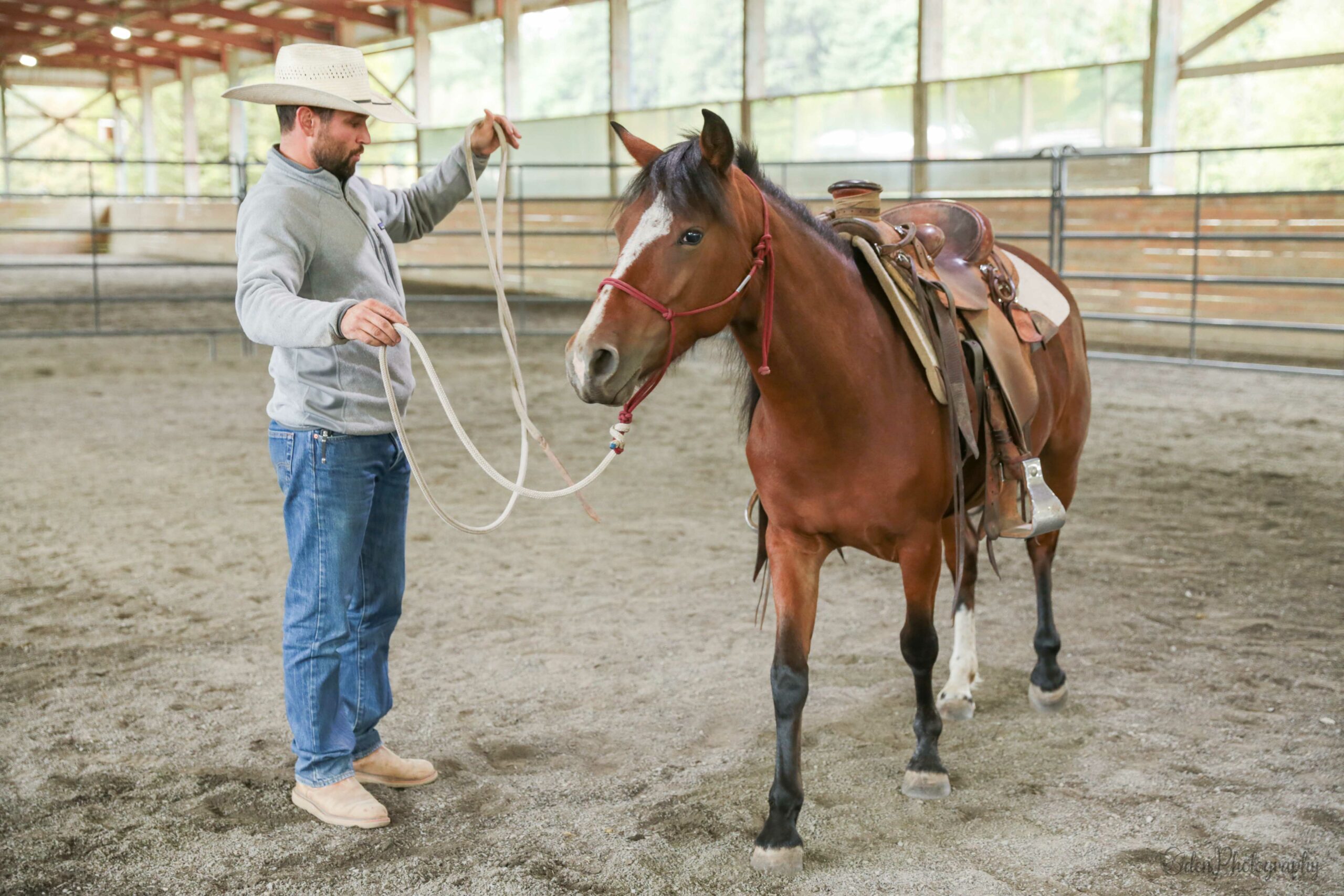Pepper
2018 Bay Yakima Reservation Horse
Type of Rescue: Animal Control Surrender
Intake Date: 9/29/2020
Adoption Date: 5/16/2024
Length of Time with SAFE: 3 years 8 months
ADOPTED!! by Sammamish Animal Sanctuary
Pepper was one of 24 wild Yakima horses seized in December 2019 by King County Sheriff’s Office, in cooperation with Regional Animal Services of King County and SAFE. Pepper spent her time at SAFE in a herd with two other mares, Veronica and Sienna. While at SAFE, Pepper’s rehabilitation went relatively smoothly with no major health issues. Once her condition improved, Pepper was trained as a riding horse. In her new home with Sammamish Animal Sanctuary, Pepper joins other rescued farm animals in a secure forever home.
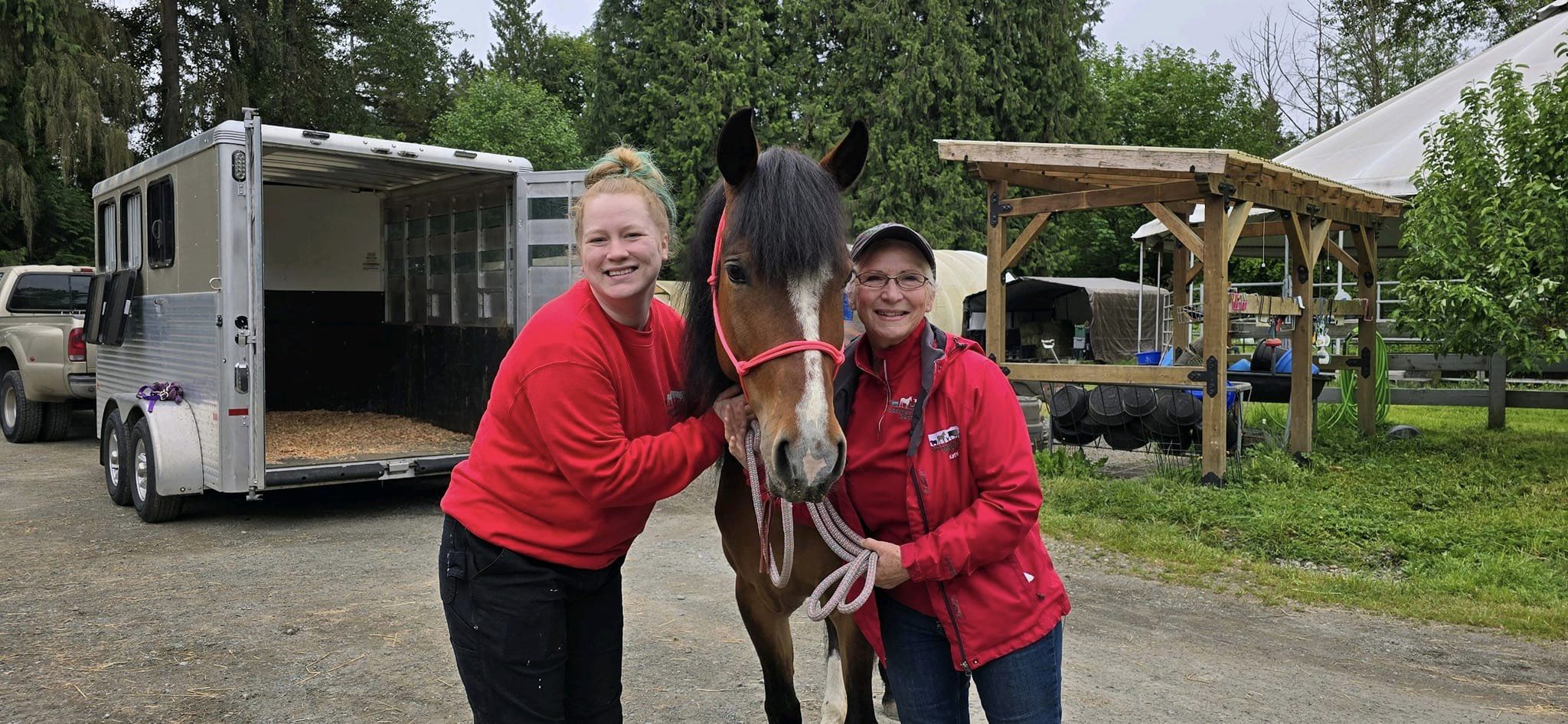
Pepper is Adopted!
We loved Pepper at SAFE, but it was hard not to walk by her stall or paddock and ask, ‘you’re still here?’ Pepper was one adoptable little pony! But good things come to those who wait, and indeed, when the wonderful folks at Sammamish Animal Sanctuary came knocking, Pepper answered. They had a two-fold desire, you see. One of their horse residents had just passed, leaving her equine BFF lonely and in desperate need of a friend. They were also looking for a light riding horse who could one day mature into the job of lead-line pony for children’s camp programs and the like. Pepper, loyal friend to Veronica and Sienna and others before them, ticked the friend box with a big bold line. The lead-line pony job would be one she would grow into, but because of the hard work she had been doing under saddle, she had a solid foundation that, as it continued to be built upon, would prepare her perfectly for the kids horse title one day.
All prospective adopters of riding horses come to ride, and Pepper’s ride went smooth as could be. Then it was just about setting a date to take her home to the farm. On the day of, she loaded on the trailer and was on her way to her new life amongst goats and pigs and horses, just to name a few of the creatures soon to join her family. There was a welcoming party ready to greet her as she stepped off the trailer, and she took a brave walk around the farm to greet all the faces sharing her address. They were all curious about her as she was about them. But happiest of all was her new horse friend, Abby, who was immediately smitten with Pepper. The feeling, it seemed, was mutual!
Since arriving at her new home, Pepper has settled in tremendously well. Her work under saddle is continuing, and by all reports she is doing great. Her bonds with her horse friends have only continued to grow, and the same can be said about the humans who she spends time with each day. You can visit Pepper and all her friends at her new home by scheduling a visit at https://sammamishanimalsanctuary.org/. Congratulations, Pepper!
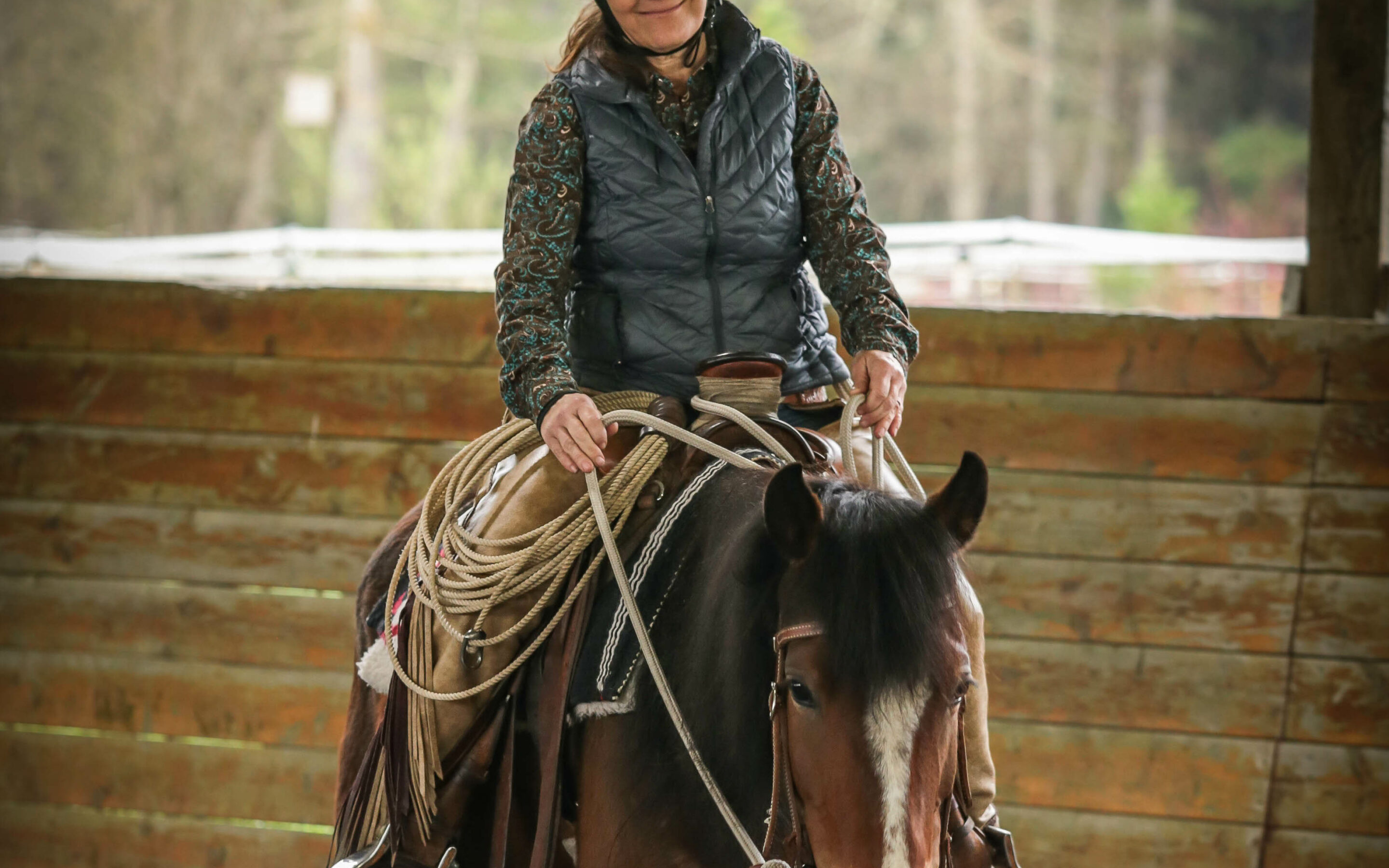
March Joel Conner Clinic Report: Pepper
Candi K, who has been working with Pepper since her return to SAFE, rode this cute little mare in the recent Joel Conner clinic. Here’s what she had to say about their time together:
“When it comes to our sweet Pepper, Cher says it best in her song “Just What I Have Been Looking For”
You’re just what I’ve been looking for
Something I never thought I’d find
And everything I ever dream of
Is getting closer all the time
This past week Pepper and I participated in her 4th consecutive Joel Conner Horsemanship Clinic. In the arena with 11 other horses and riders she was cool as a cucumber the entire three days. Between the two of us we have developed a great feel and I feel confident working amidst the other horses. When we are not working, she is calm, stands still and does not fidget.
Our main focus this clinic was moving her hind quarters through groundwork and in the saddle. While she is definitely improving moving the hindquarters still needs consistent work. This will allow her feet to be free, allow her to move her front quarters and assist her in moving easily from the trot to the lope.
We also worked on unified circles concentrating on keeping her from falling in on her right shoulder. We also practiced and the soft feel at the walk and trot. Over the past several months I have been working with her to move her hind in a full circle from standing still. She showed off her pivot this weekend.
Pepper has a nice soft trot which is comfortable to ride. She does love to move out and her lope is smooth with her thick mane blowing in the wind. That being said Pepper, does live up to her spicy name when she has had a day off. She has to be moved out so she can kick up her heels before we do any riding.
It has been quite the journey for both of us since last July. We have grown together. I would definitely recommend that her future adopter continue with the Horsemanship Training on a daily basis. She is still young, and both the adopter and Pepper will benefit from it. She will be a great trail horse for someone who wants to get out and enjoy the ride. This sweet girl is ready for her new forever home.
As Cher says,
You’re just what I’ve been looking for
Something I never thought I’d find
And everything I ever dream of
Is getting closer all the time
Ah I believe you want me too
And love is in your eyes
You’re just what I’ve been looking for
Just what I had in mind”
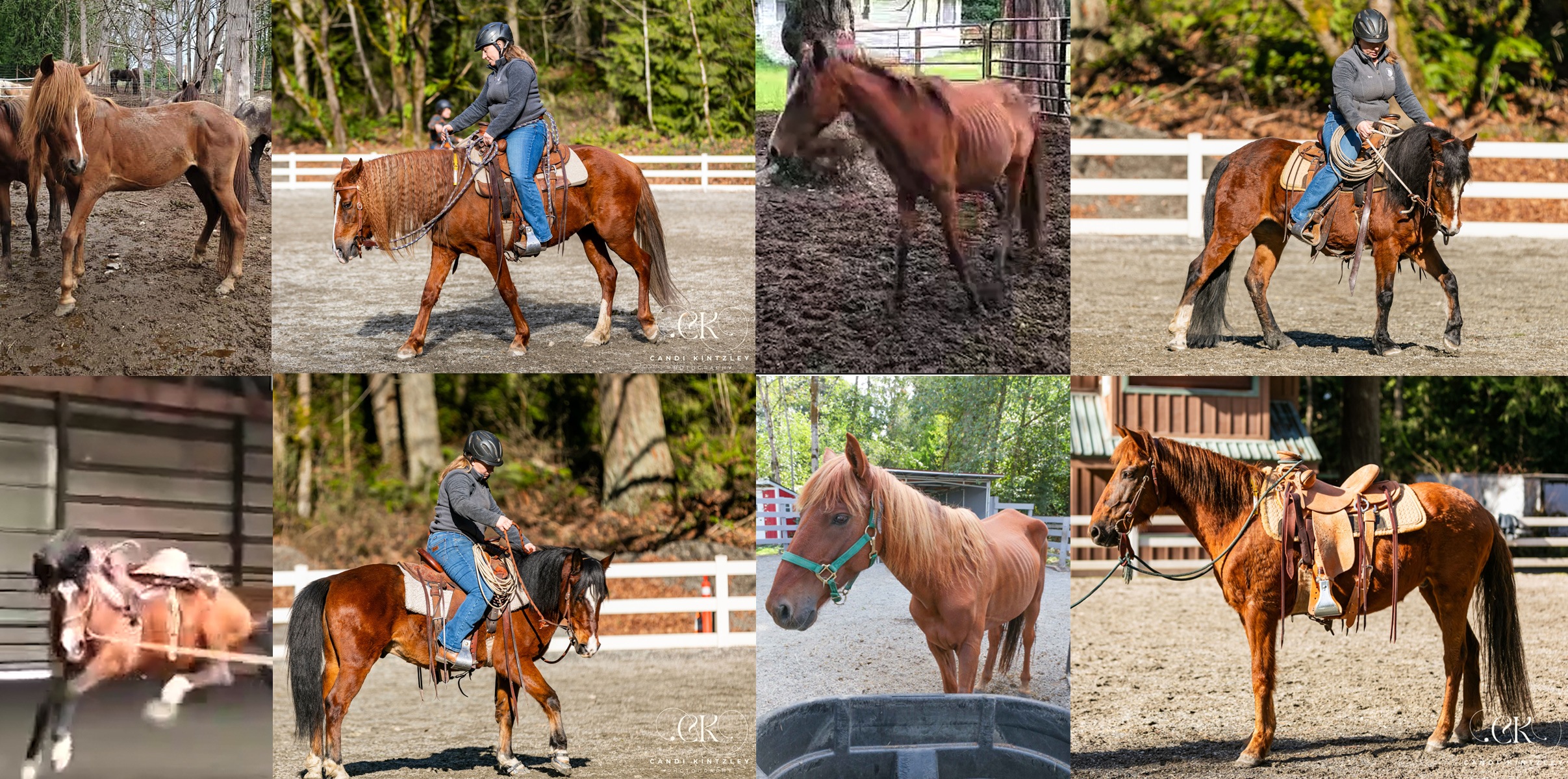
Transformations
Gradual change can be difficult to see, especially when what you have in front of you is almost impossibly different than what once was. Below is a quick before and after of a few SAFE horses, and their nearly unbelievable transformations over the years at SAFE.
Veronica came to SAFE in 2019 as part of the Fall City 40. Back then, she was essentially feral, thin as a rail and with her long luscious mane twisted into a snarl. Her wariness and sense of self-preservation was strong and long-lasting, and it was difficult to imagine that she would ever be truly gentle, let alone ‘make it’ as a riding horse. And yet, here we are in 2024, where Veronica has been under saddle for going on two years now. That sensitivity still exists within her and likely always will to some degree, but through the support of a strong rider, Veronica has been able to make her way out of the arena and even off the property. Her transformation has been immense and incredible.
Artie was also part of the Fall City 40 seizure. A stallion at the time of his rescue, he lived in the covered round pen during his early days at SAFE while work was done to gentle him, as there was a good chance he would have broken free from the confines of a regular paddock. Artie was also one with a high degree of self-preservation, accustomed to having to look over his shoulder in order to protect his band of mares. Even after a tremendous amount of prep work, his first saddling was explosive, and had us rethinking if it was worth it for him, or for us, to continue the journey of making him a riding horse. But now, several years later, Artie is nearly unrecognizable as the gentle, intermediate riding horse he has become.
Edward was surrendered back in 2021, with severe respiratory issues that left him in need of substantial medical attention. With such poor lung function, whatever calories should have been going to his nourishment were instead being used to keep him breathing, leaving him very thin in addition to being unhealthy. He was a nervous guy, in turns pushy and flighty, and aside from the hurdle of restoring him to good health, there was a great deal that he needed as far as training was concerned. But these days, Edward is almost completely unrecognizable in more way than one, and in search for his forever home.
Pepper was another Fall City 40 mare, also tremendously emaciated and practically wild. While her demeanor was perhaps more mellow than some others mentioned here, it still takes a lot to take a horse from a bag of wild bones and help them grow into a healthy, domestic creature. These days, Pepper is one of the safest SAFE horses, and a living reminder of what change looks like.
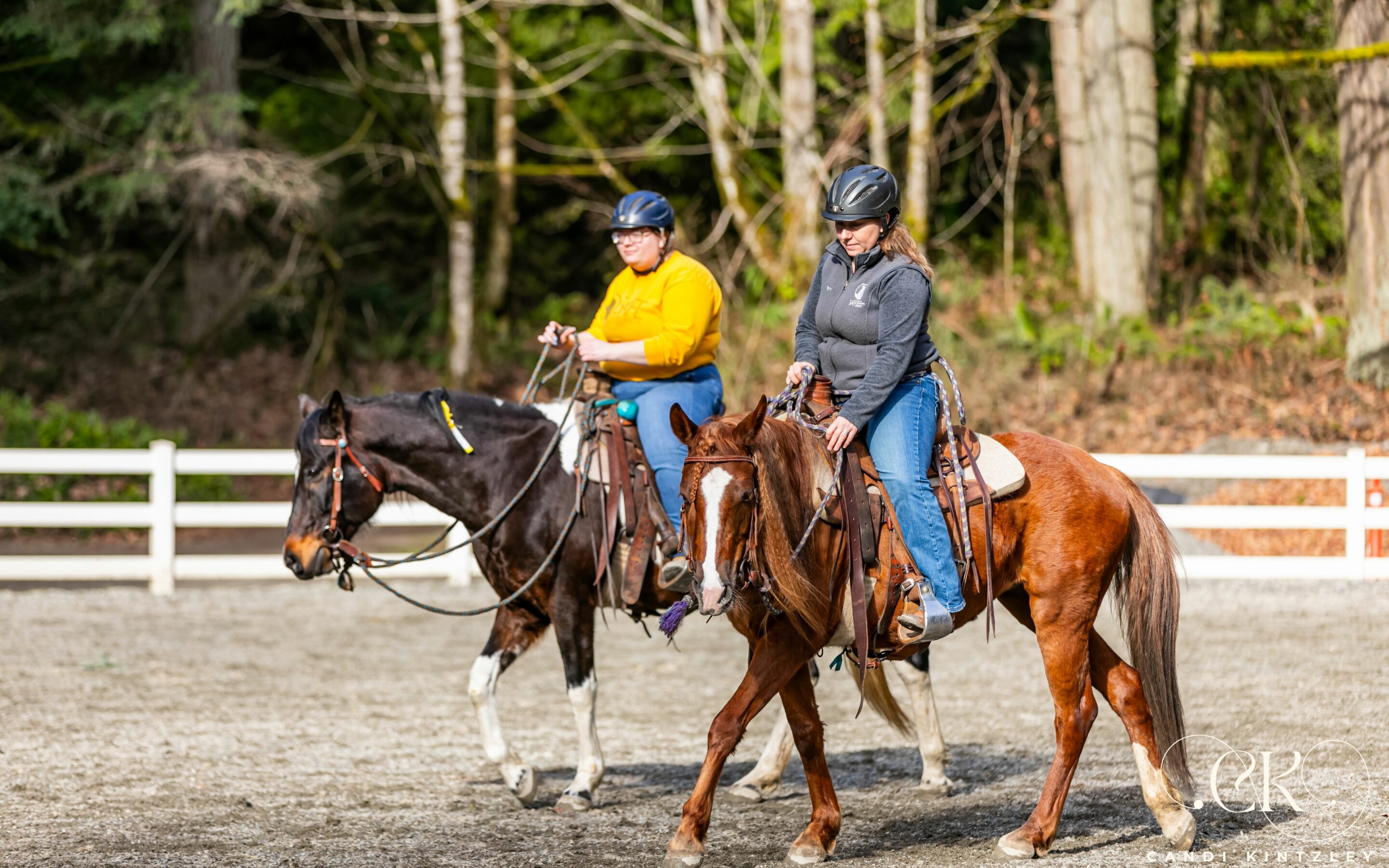
Field Trip to Bridle Trails
Winter Washington weather (say that five times fast) does not often conjure visions of sunshine and blue skies. But every so often, the metaphorical stars align to grace us with a January or February day that feels more akin to early summer.
Such was the luck we had for our first off-property excursion of 2024, a trip down the road to Bridle Trails state park. We loaded eight horses into the trailers: Alums Owen and Fancy accompanied current SAFE horses Artie, Veronica, Pepper, Tiva, Violet, and Edward. For the majority of the horses in attendance, it was the first time they had been away from SAFE since their arrivals, though you might not have guessed it by how coolly they greeted their new surroundings.
We unloaded horses and tack, and brought everything and one to one of the park’s arenas. There, we helped the horses settle into the new space through a combination of exploratory walk-and-sniffs (turns out, white vinyl fencing is snort-worthy) and groundwork. The time it took for each horse to settle varied some, though no one was particularly unsettled to begin with. Soon, everyone was cinched up, and we followed the sun into an adjacent arena.
All the horses currently going under saddle (meaning everyone aside from Tiva) had at least one, if not two or three, rides that sunny Saturday afternoon. Faced with strangers walking alongside the arena, some shepherding very interested dogs or children, as well as a stop-and-start parade of mounted riders heading out to the adjacent trails, our modest herd did tremendously well. They were able to find support in their humans when it was required, but for the most part handled the new environment and wide open arena space with level-headed grace. The countless hours that had led up to this point for each of them helped to make the entire outing hugely successful, and check some major boxes for our horses.
After several hours under saddle, basking in the sunshine and the glow of a very productive afternoon, we untacked the horses and grabbed our snack bags, retiring to a shady spot to allow for a physical and mental cooldown slash lunch break. The horses shook out their coats while they sniffed at our sandwiches, taking sips from the water buckets we’d brought as we all rehydrated for the short drive home. One stud muffin each was in order, the equivalent of your dad stopping for ice cream at the end of a road trip. Then, we loaded our tack and our horses, and headed back for SAFE in time for afternoon hay.
Though it takes some work logistically, we plan to take the horses off-site multiple other times this year, be it to clinics or for more casual adventures like our trip to Bridle Trails. We could not be more proud of the SAFE horses, and extend our thanks and gratitude to the humans who helped them, and continue to help them, in all stages of their journeys.
Check out a little glimpse of our day below:
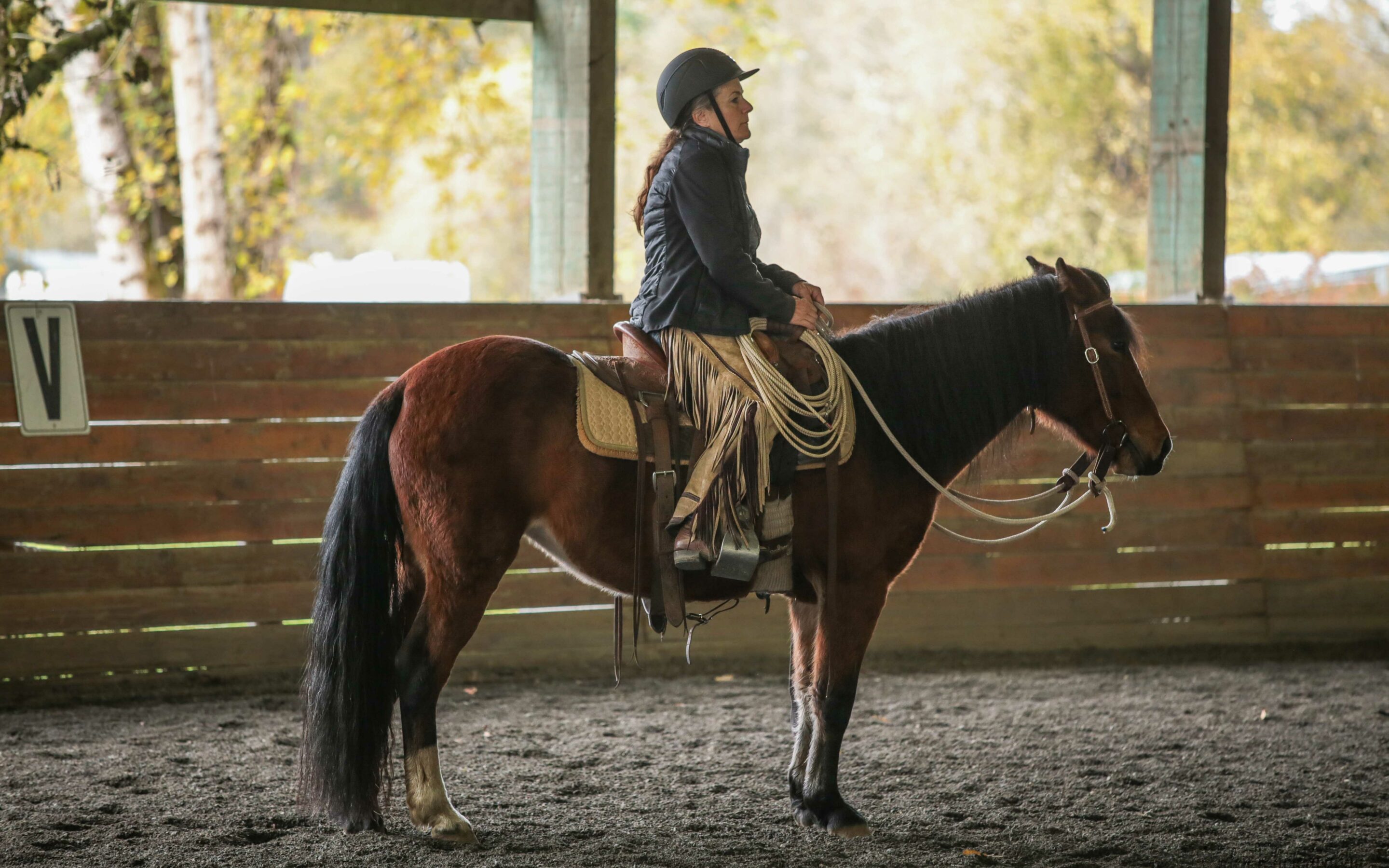
November Clinic Report: Pepper
Candi K has worked with Pepper since her return to SAFE, and has the following to say about their time spent together, specifically about their time in the riding portion of the November Joel Conner Clinic:
“Who doesn’t love a little spice in their life? Pepper may be a common ingredient for some, but she is far from common in both personality and willingness to learn. Since August of this year, I have had the great fortune to work with Pepper and attend three Joel Conner Horsemanship Clinics with her.
In all honesty in August, at the first clinic, Pepper was determined to show me that she was the spicy one in charge of our groundwork. She would not move off of me to the right, achieving successful hindquarters was challenging and backing up well, she had other plans. Together we worked on these exercises and in the September, we had shown improvement.
Fast forward to November where Pepper and I spent all three days in the saddle for clinic amidst 12 other riders and their horses. She was as cool as a cucumber maneuvering around the full arena. Never once was she bothered by all the other activity. We worked on moving forward and stopping from a feel, drifting the hind in a united circle, bending to a stop, hindquarters, trotting on a straight line and so much more. She stood quietly and patiently every time we had instruction from Joel. The three days were packed full of learning, and she was a champ. Did I mention the monsoons, thunder and windstorms? Pepper wasn’t fazed by it and could have cared less.
While Pepper can still be a bit pushy on the ground, we are setting more boundaries and she is a quick learner. Before clinic she would love to walk down the aisles of the barn a grab a snack from each the hay buckets in the aisle. She would also like to investigate the ground and not pay attention when walking, grooming and saddling. All these things have been cleared up and she is with me as we go through these daily routines.
I think everyone needs a little “Spice Girl” aka Pepper in their life. This sweet little mare will make a great addition for someone looking for a trail horse while filling their hearts and home with love.”
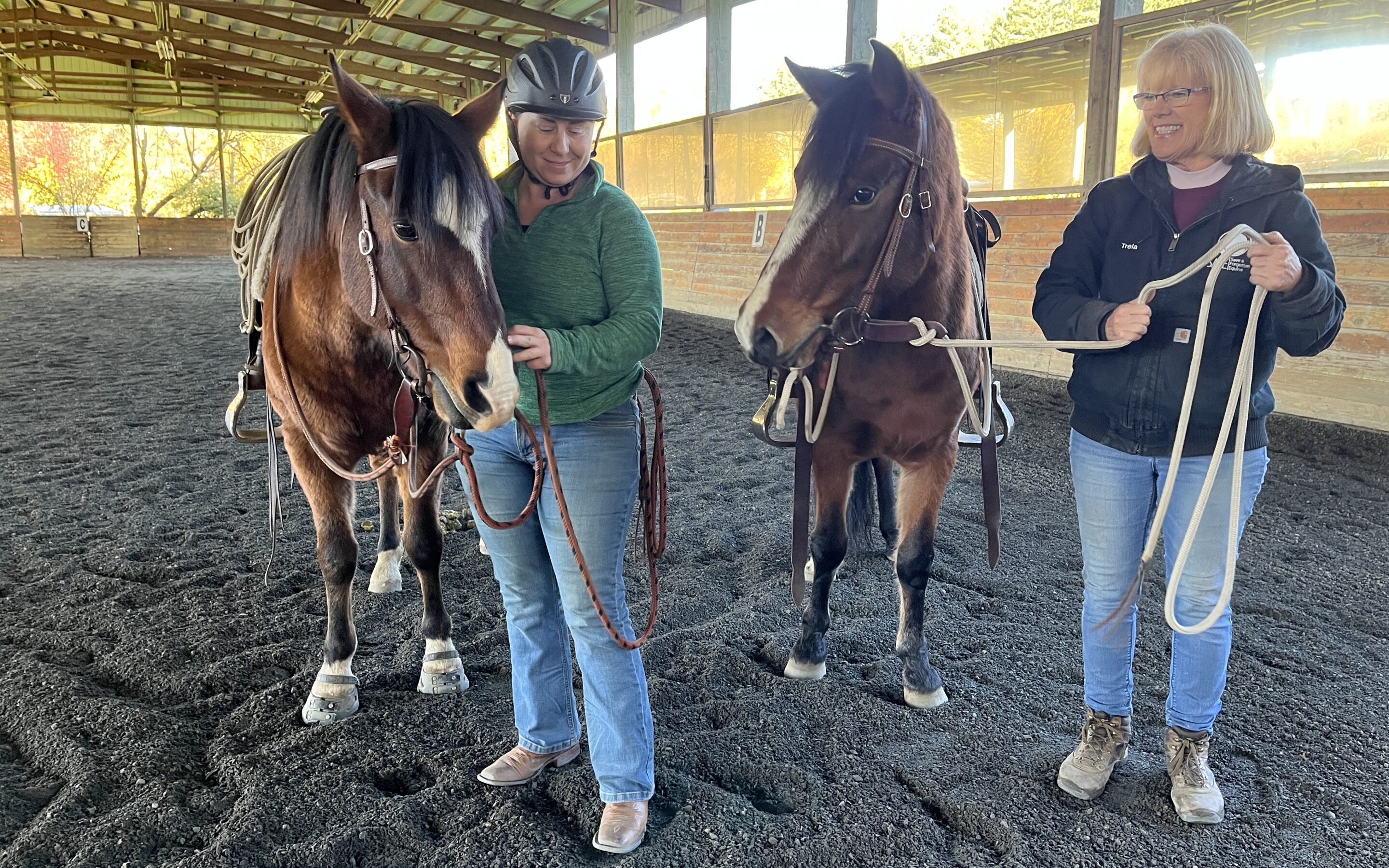
Twinning with Artie and Pepper
Halloween might be over, but it appears that Pepper and Artie are still dressing up as one another! These two are truly doppelgangers, and as they both hail from the Fall City 40 herd, it may be that there is some genetic connection to their similar looks. But regardless of if they are any percent related, they are both 100% cute!
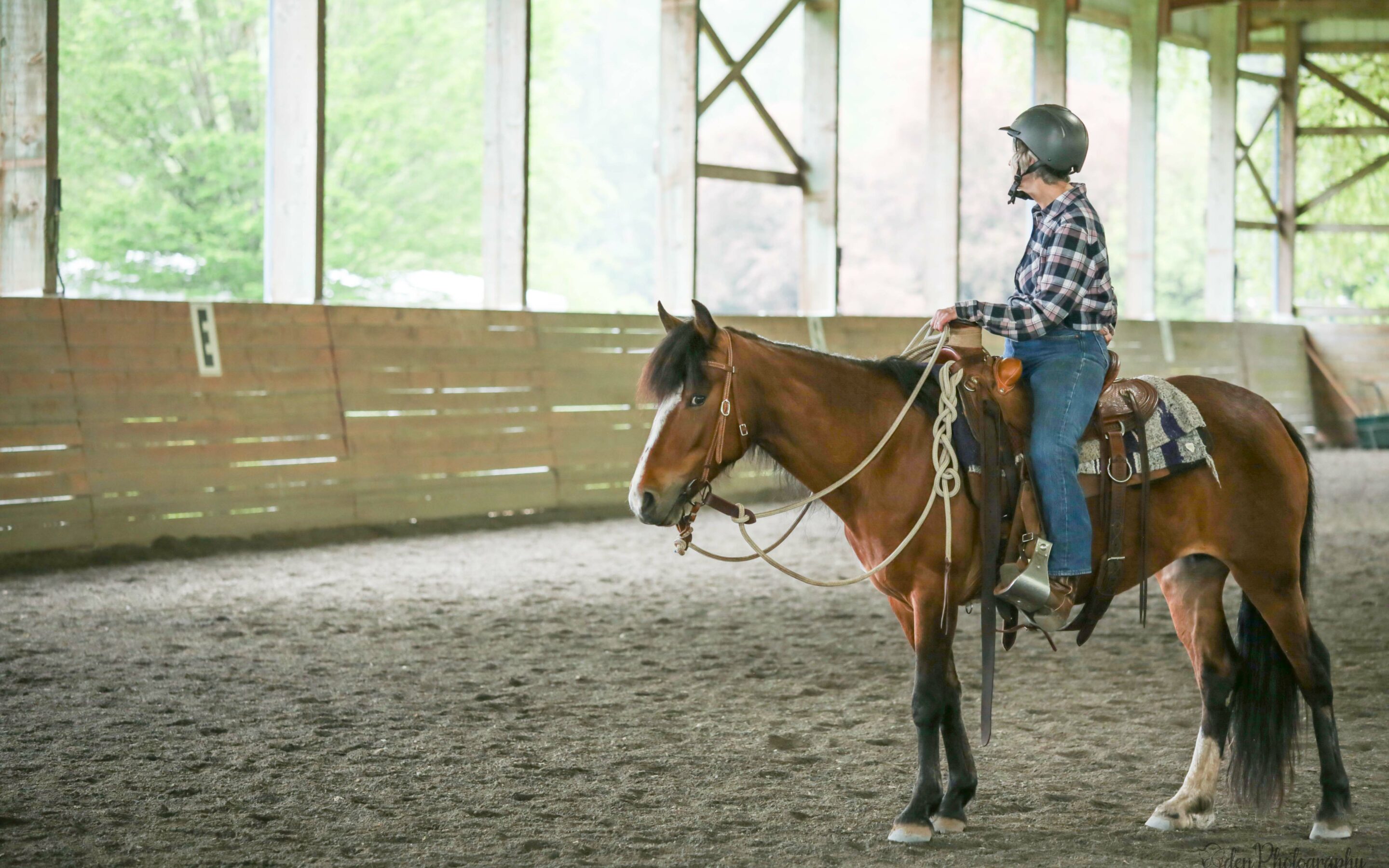
Ready to Take Home: Pepper!
Sweet Pepper has been back at SAFE for a few months now, has received a restart under saddle, and is ready to start meeting adopters. Due to her confirmation, Pepper will never be a tremendous athlete, but she is sound for trails and light riding, which is exactly what she’s the very best at. We work on helping Pepper to become a get on and go type, and she is a pretty straightforward ride if all you wish to do is “point and shoot.”
Pepper is a sweet and easy-going girl, but can be a bit pushy on the ground, especially if she thinks she can get away with it. She will do best with a confident handler who can set boundaries — while she might need the occasional reminder, Pepper does tend to respect a boundary once it is established.
We have referred to Pepper as a ‘geep’ (goat-sheep) because of the unique bleating-whinny she has. Much like how she is with people, out with horse friends, Pepper respects a leader and is great in a herd setting. She loves to spend her afternoon napping with her buddies, and when she comes in a stall at night, enjoys taking mouthfuls of hay and dunking them in her water buckets. She is a cute and silly little pony, and more than ready for her future home.
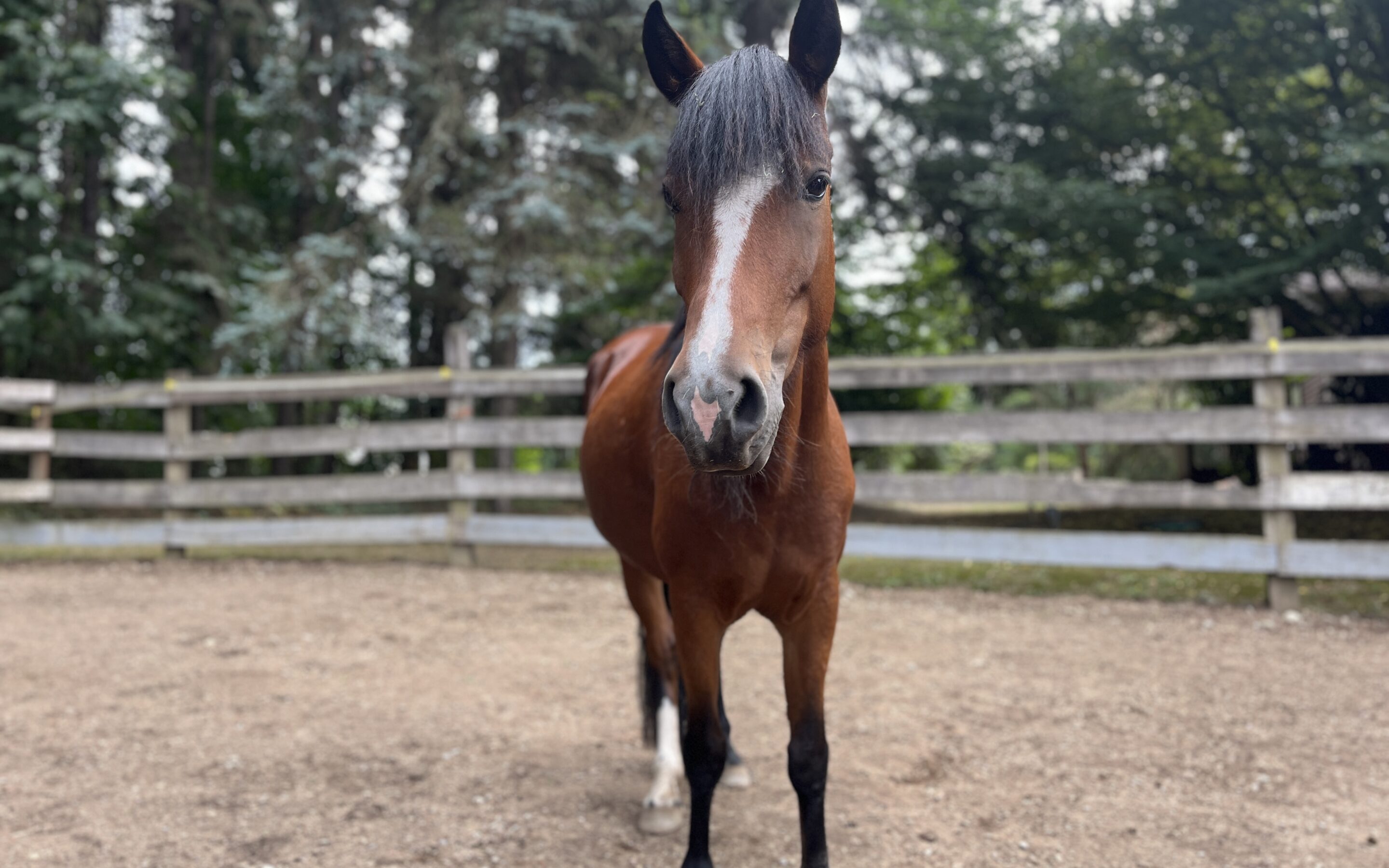
Pepper’s Return
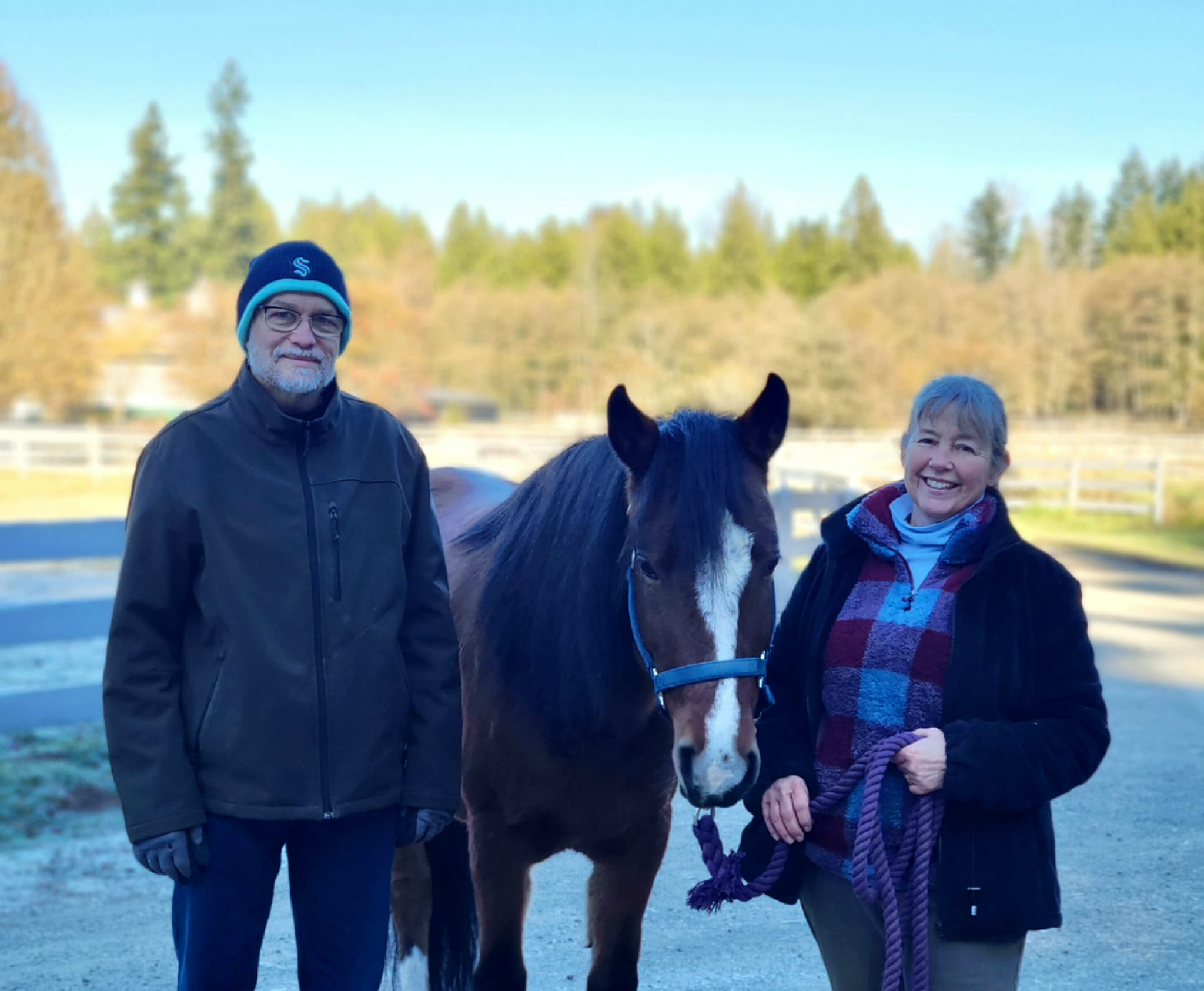
Pepper is Adopted!
Another one of our Fall City 40 is adopted! Our adorable, goat braying, fluffy maned little girl is all grown up and living her best life as a best friend to her big brother, Cal, a 17 year old 16HH Andalusian. Her adopter, Sue, was looking for another friend for Cal when his buddy passed away earlier this summer, leaving a huge gap in their lives and a distraught Cal. Sue’s family is passionate about “adopt don’t shop” and while their priority was to find Cal a friend, they were thrilled to also find a riding partner for Sue. The two may even participate in future Joel Connor clinics at SAFE!
When we first met Pepper she was living with a large herd in a muddy field with no shelter, not enough food, worm infested and in need of medical and farrier care. Now Pepper is enjoying her new life in Granite Falls, WA on a BEAUTIFUL property, with a new best friend, and a family who adores her. This is the life a horse would dream about and the life Pepper deserves.
- Pepper at the Fall City property
- Pepper at SAFE
- Pepper and Sue
- Cal and Pepper enjoy sunrise breakfast
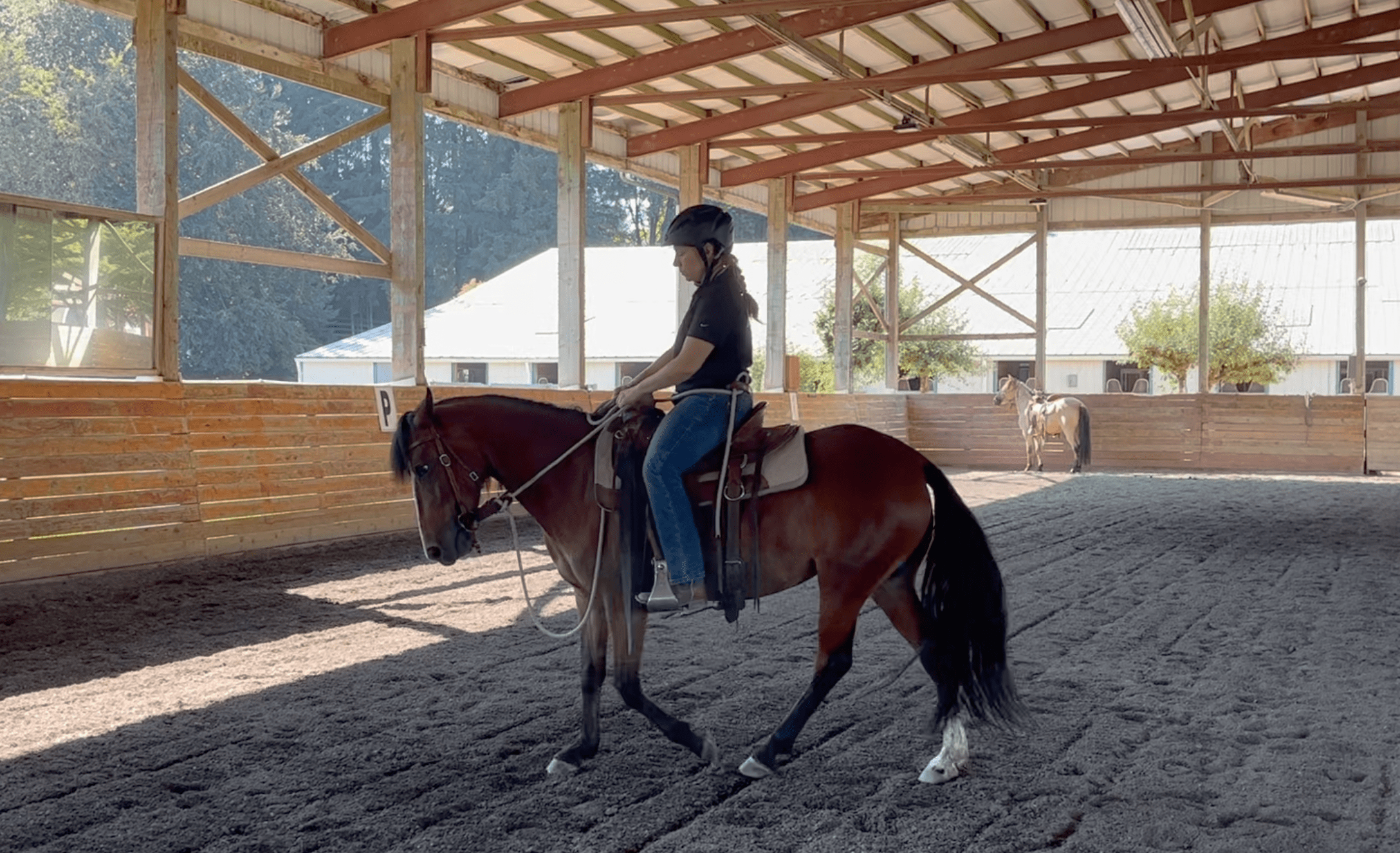
Pepper in the Arena
More arena work with Pepper, this time showing some soft feel work and backing circles.
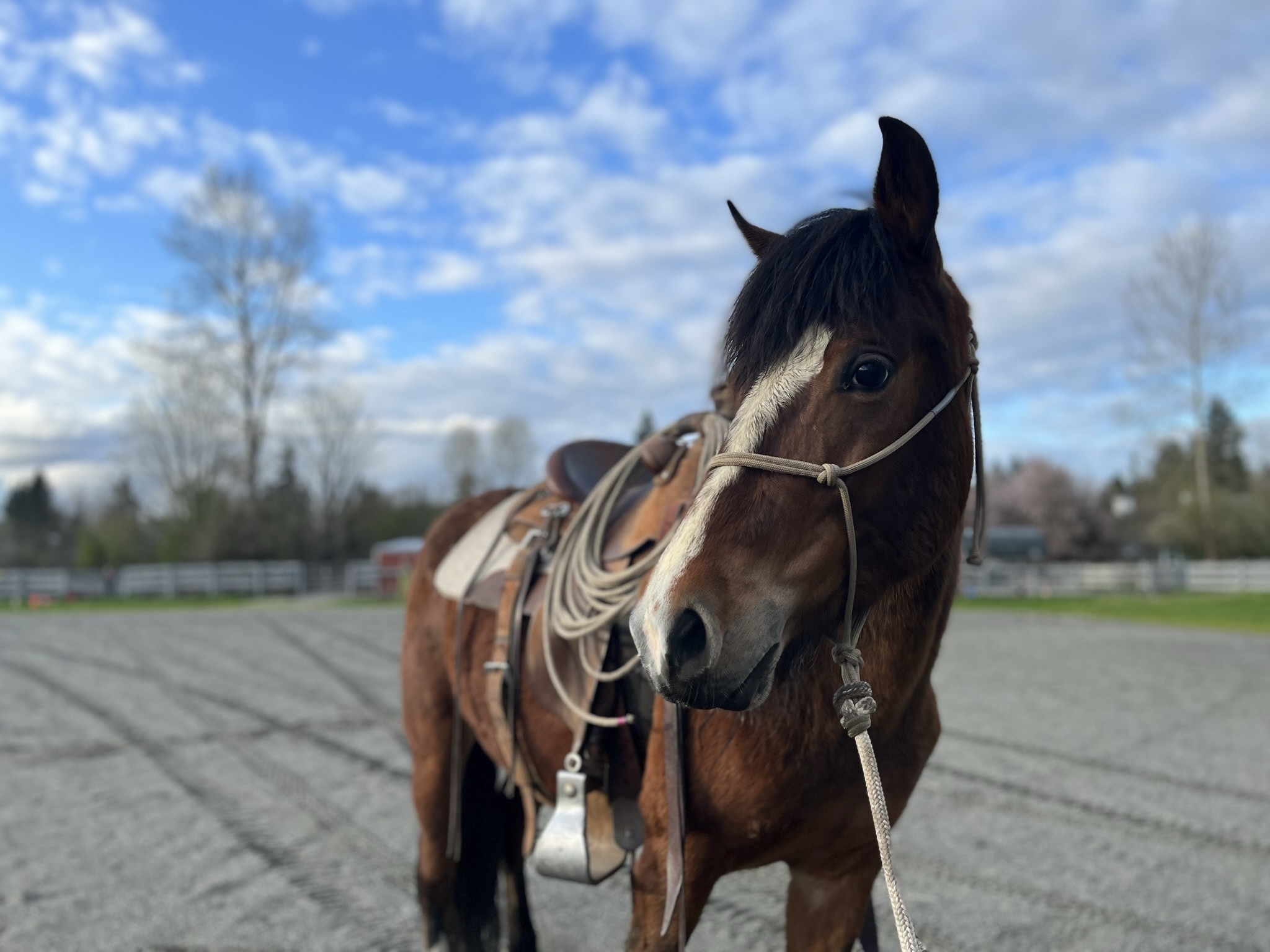
Training Update: Pepper
Pepper was saddled for the first time last June, and has come a tremendously long way since then. These days, she’s riding in the big arena more often than not, and is learning how to carry herself with more balance and straightness. It’s hard to imagine this little mare started out as a wild thing considering how gentle she is today! But don’t take my word for it, check it out for yourself below:
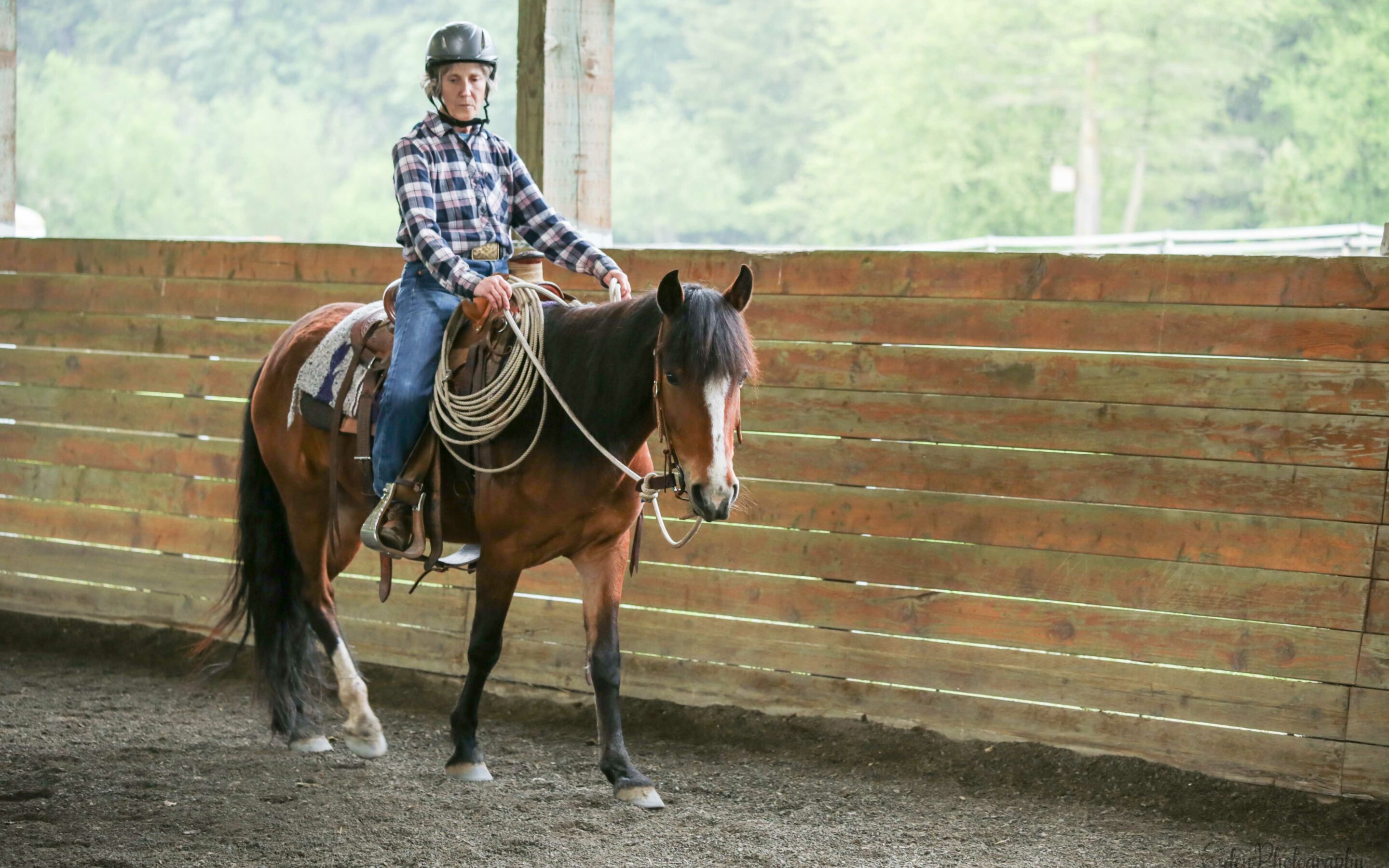
June Joel Conner Clinic Update: Pepper
One of our volunteer riders, Sue, had this to say about riding Pepper in the most recent Joel Connor Clinic:
“I was so excited to get to participate in the riding portion of the June, 2022 Joel Conner Clinic at SAFE. It was my first chance at this, and I was very fortunate to ride Pepper, who really made it all possible. She is a young mare, a bit green, but with a ton of try. As a long time hunter jumper rider, I came to this clinic very aware of aids that I would instinctively do incorrectly for this discipline, too much contact, too much leg, too much outside rein; the list goes on. I tried hard to listen and make no assumptions about what the correct aid was, just follow instructions.
Happily, Pepper was a champ at working through this with me. I know that I must have confused her at times, but she never got frustrated, just did her best to do as I asked. She has a lovely trot and moves up and down from it nicely. I think we improved at riding a line at the walk and trot. We need to work on maintaining the line better at the lope, but I am confident that issue is more mine than hers, and will improve as I get a better feel for that transition. I learned to execute hind quarters and front quarters from the saddle for the first time which was fun. She is happy to accept a soft feel, and I am learning what level of contact is appropriate there. All in all, I came away thinking that the alternate riding disciplines are more alike than different, and have a bit more trust in my instincts.
I see a bright future for Pepper as a riding horse. She feels very safe and accepting, and definitely wants to please. Thank you to Terry for the opportunity, to Joel for working through this with me, and of course to sweet Pepper.”
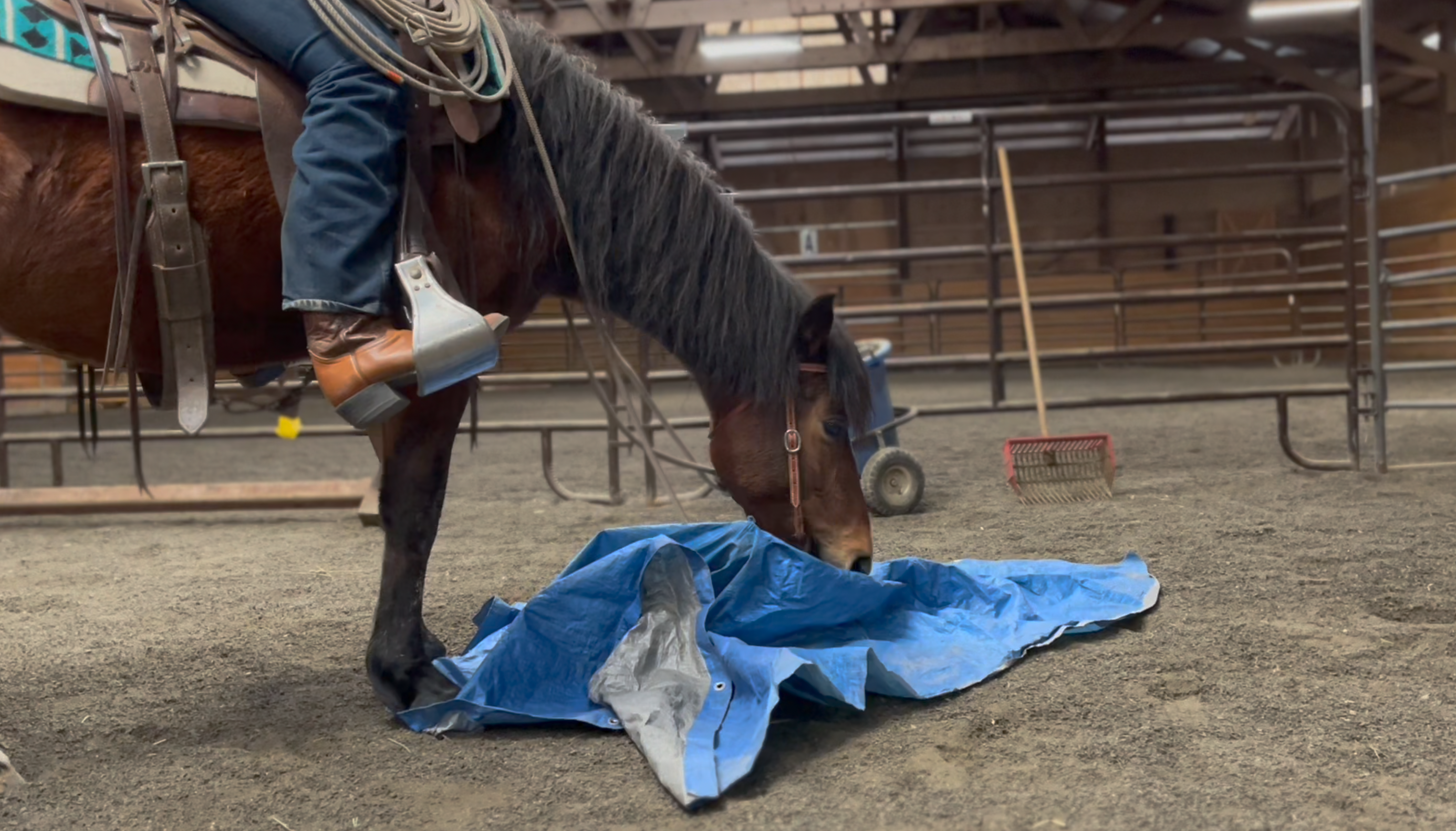
Wonderful Pepper
Here are some things we love about Pepper:
Her playfulness — she and current herdmate Veronica spend the afternoon chasing each other around the paddock, bucking and biting and having a grand ole time in the way horses do.
The way she gives herself a water bucket facial each night in her stall. There must be a method to her messy eating madness, but we certainly haven’t unraveled it yet. After dinner, it is common to see alfalfa-generated foam in each of her water buckets, and a vast majority of said water bucket’s contents covering her face. “Why do you look so damp?” we ask her when we pull her from her stall, and if she could answer she might say “because I am!”
Her curious nature. She’s got an investigative personality, wanting to touch the world with her wriggly little lip. What’s in that brush box, and can I have it? Whatever’s in that bag of chips looks awfully good (the answer is: Cheetos). In fact, orange things have been of particular interest to Ms. Pepper. Once, when being led out of the arena after working, she spied a half-drank bottle of orange sports drink that someone had left. In the blink of an eye, she had managed to grab the bottle, and in shaking her head with it, mimed as if she was drinking. Only fair, really, since she did just work very hard – gotta restore those electrolytes!
She is a silly and delightful little horse, full of antics. But don’t let her goofy nature fool you – she is also very brave. She’s been out on the trail several times for walks (and a ride!) and has crossed bridges and passed bicycles with barely a blink. She is certain to make someone a wonderful partner in the future, just the right combination of cautious and curious.
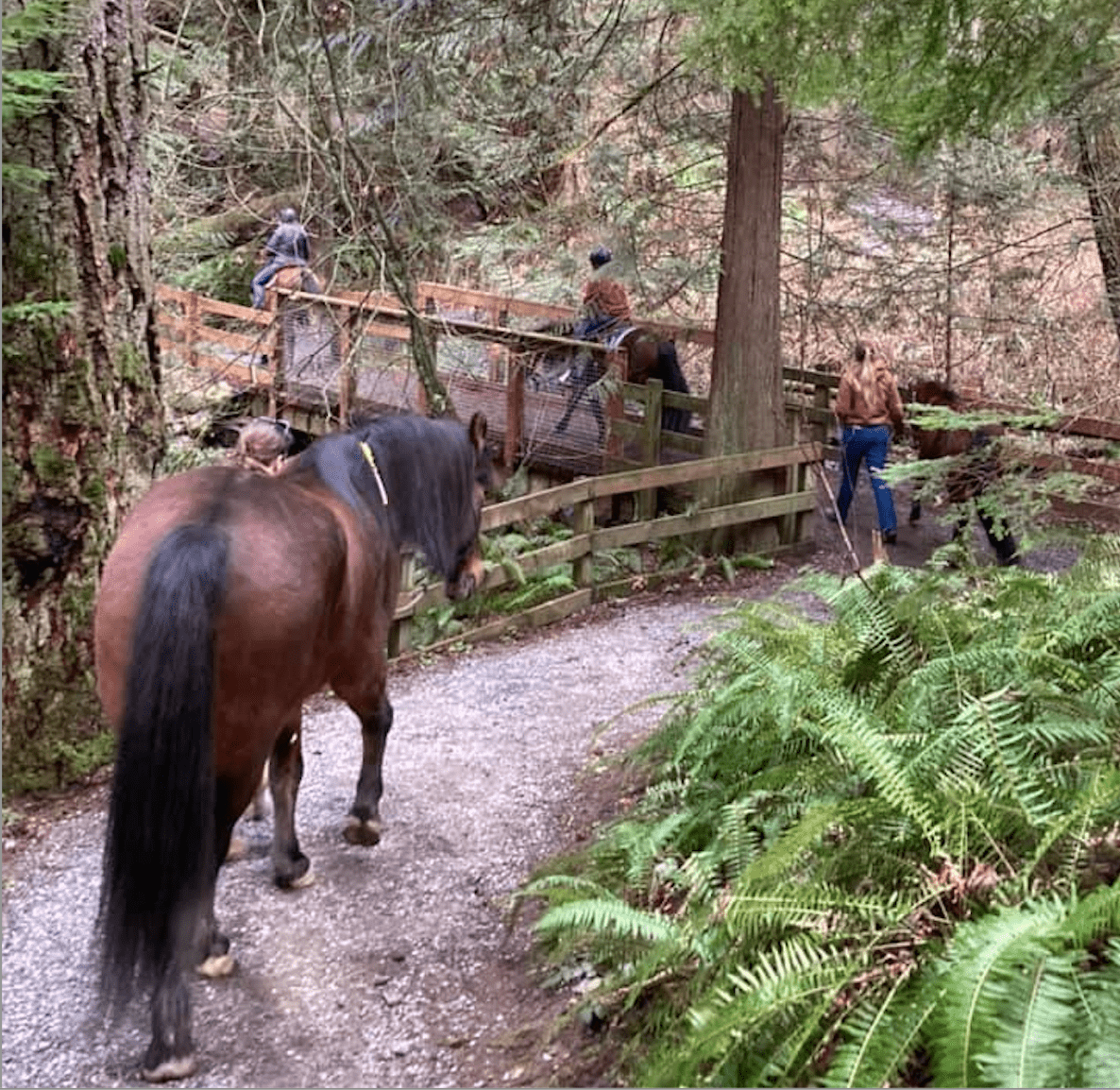
A Walk in the Park
Spring is just around the corner, and although some days, when the ground is frosty and the rain won’t stop, it certainly doesn’t feel that way, there are days (becoming less rare) when it feels almost something like June. Here at SAFE, we take full advantage of days like this, as well as easy access to the park trails next door – a match made in heaven.
On a few of these days, we saddled up some horses and took to the trails. The order of go as follows:
Bonnie on Owen, bravely leading the way.
Kaya on Jill, comfortable to lead but just as comfortable to follow.
Lily walking Pepper, happy to be middle of the pack, but not necessarily uncomfortable when her leading friends would occasionally disappear from view.
Lexee walking Nyx, content to bring up the rear.
While there are many routes to take, the tried and true staple is a loop trail that takes the horses through all sorts of unique scenery and obstacles.
We start out on a forested path, evergreen branches swaying overhead, the soft earth of the ground muffling the hoofbeats. Birds chirp and plants rustle as we pass, a snapping twig or crunchy leaf adding to the ambiance, but otherwise, the atmosphere is quiet and peaceful. The horses are alert, their ears pricked forward, but no one shies or spooks. We round a corner, and the forest opens up, with a thin trail banked by an expanse of lawn to the left. There’s a playground here, and the shouts and calls of children at play reach our ears before the children themselves come into view. The petting farm is in sight too, and roosters squawk as donkeys bray – quite the cacophony after the relative quiet of the forest. But our horses continue bravely on, not always totally unfazed by what’s going on around them, but able to find comfort in our direction. We may need to pause and let them take it in, having them change eyes on the source of their anxieties to show hey now, nothing to be afraid of, here it is from both sides and how you can move your feet. Once we’re past it, emotionally, we move past it, physically. The forest closes in on us once again, the trail winding around trees and stumps until we reach the first bridge we must cross. This could be quite the obstacle, but our horses cross bravely with little hullabaloo (for a brief moment, Pepper is concerned, but it doesn’t last). From there we go up, and for a time it feels like we are no longer in Redmond, but rather deep in the woods somewhere, far removed from parking lots and roadways. We keep a careful eye for anyone who shares the trail, announcing ourselves as we round bends. When others do pass, we turn to face them as they approach and turn to follow them as they leave, in a way giving chase. The trail opens at a point – where it intersects with the powerline – and we embark on a steep downhill journey towards where it reconnects with the park. In summer, the bushes that line the road will be thick with blackberries that we may or may not feed to ourselves and our horses, but for now they sit as brambles, a promise of what’s to come. Then, back into the park we go, this time coming up the side of our neighbors and then the fenceline that our own property shares. We step over logs as we see SAFE horses from a different perspective – Nova and Rae rush towards the fence once they realize who’s coming, and a small chorus of calls erupts from the herd.
And then, we’re home, with a few more trail miles under our cinches, and dreams of summer when we can go out all the time.
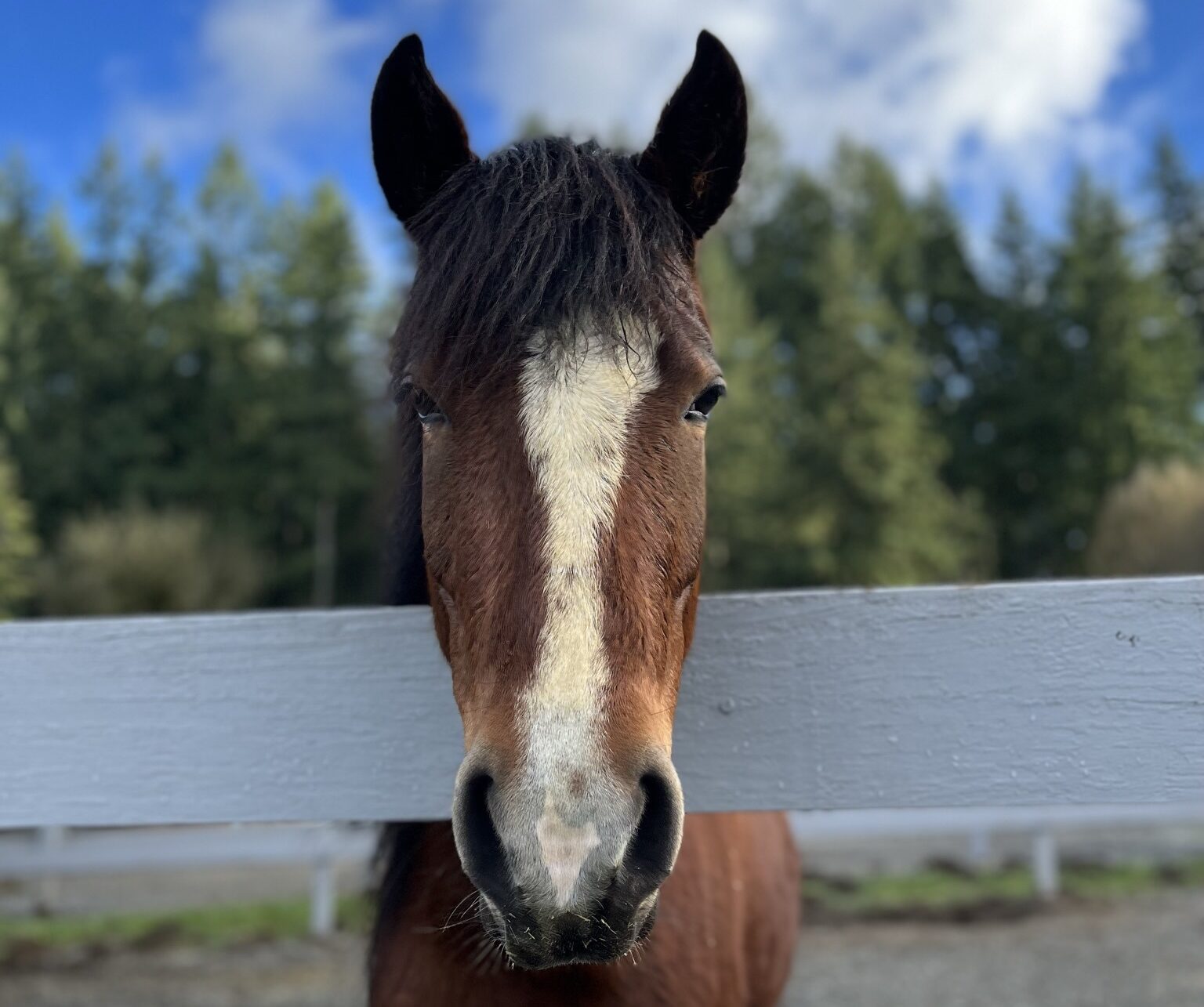
Pepper’s Progress
Pepper has recovered from a wound on her hind leg that had her on stall rest for a couple months. She was a star patient for all her treatments and even coped really well with being separated from her herd and stuck in a rehab lot. Pepper has just been back to work this week and really picked things up right where she left off! The back cinch is still an issue for Pepper, but we’re seeing definite improvement when we work with the rope before saddling.
Every day, she is quicker at getting through her trouble with the back cinch and lining out in understanding. Pepper is still very green, but we are hoping to get her out riding in the big arena this spring and out on the trails! She’s been hand-walked with her buddies on the trails near SAFE and she loves it. Crossing bridges without hesitation, walking by bicycles, loud children, dogs, and other horses like a champ!
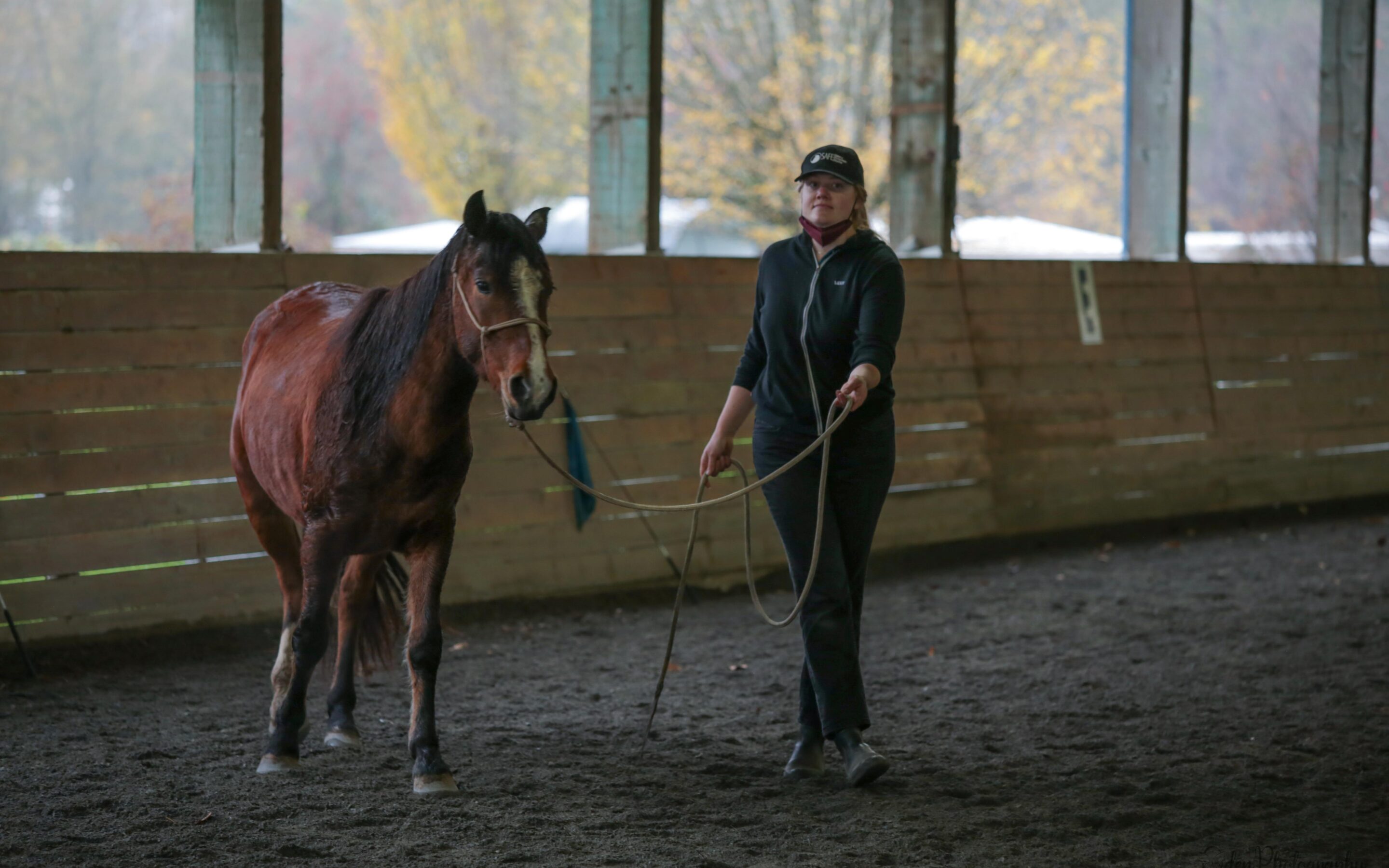
Playful Pepper
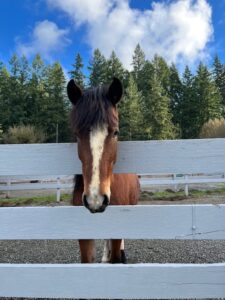
Pepper in her rehab paddock
This little rascal must have decided to play a little too rough with the big girls and got a nasty laceration on her cannon bone of her hind left leg. Luckily it is very far from her heart and time is all that is needed to heal. It was covered with long winter coat and was discovered a bit too long after the injury to be sutured, so we were left to just clean it up, clip the hair away and keep a bandage on it until it heals. She has been as pleasant as a young mare could be in her rehab paddock. She would MUCH rather be out with her gal pals but hopefully she will heal quickly and return to the normal daily shenanigans with Sienna and Veronica.
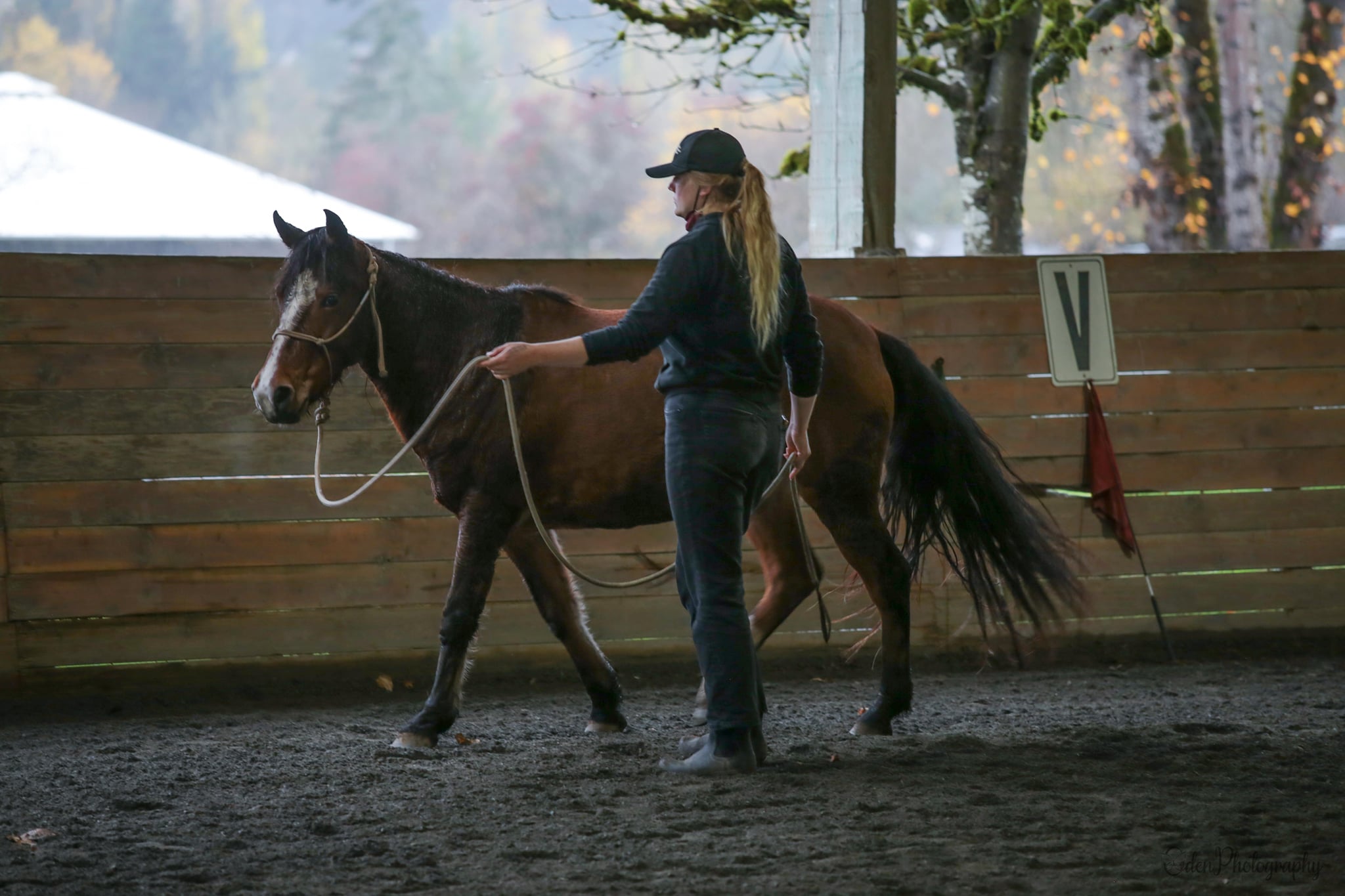
Pepper at the Joel Conner Clinic
Pepper was quite busy during Joel’s last visit to SAFE, for not only was she my companion in the groundwork portion of the clinic, but she was also present in the colt start. Because she’d worked so hard in the days prior to our groundwork sessions, she was a little bit sore on her right side, but throughout the weekend we still managed to get quite a bit done tracking mostly to her left.
Last clinic, we worked a lot on front quarters — me on keeping my angle, and Pep on being able to ‘make it’ in the movement. There are some horses who are able to fill in the gaps for people, and at this point, Pepper is not one of them. If I stopped my feet (which I am prone to do) or changed my angle even the slightest bit when asking for front quarters, whatever front quarters she did have would fall apart. However, we made some great strides (literally!) over the weekend, and she was able to successfully execute front quarters on more than one occasion. Her lack of balance in her feet means that she is also prone to falling forward, so backing her up after front quarters is important to ensure she rocks back on her hind, but by the end of the weekend she was anticipating being asked to back and rocking back on her own.
We also worked on developing life, and we did reach a point where she was very responsive to what I was asking her. More often than not, I was able to ask her to move out with just my ‘good deal,’ meaning I did not have to pick up the pressure before she took me up on my offer. It is really delightful to have moments of feeling in sync with a horse, and I appreciate Pepper’s enduring patience with me as I develop my feel.
I am fortunate to have had the opportunity to get to work with the same horse two clinics in a row, for it offered me a broader picture of not only the areas both of us needed to work on, but also where we had improved. It is always a joy to get to learn and grow alongside Pepper, and I look forward to our continued partnership!
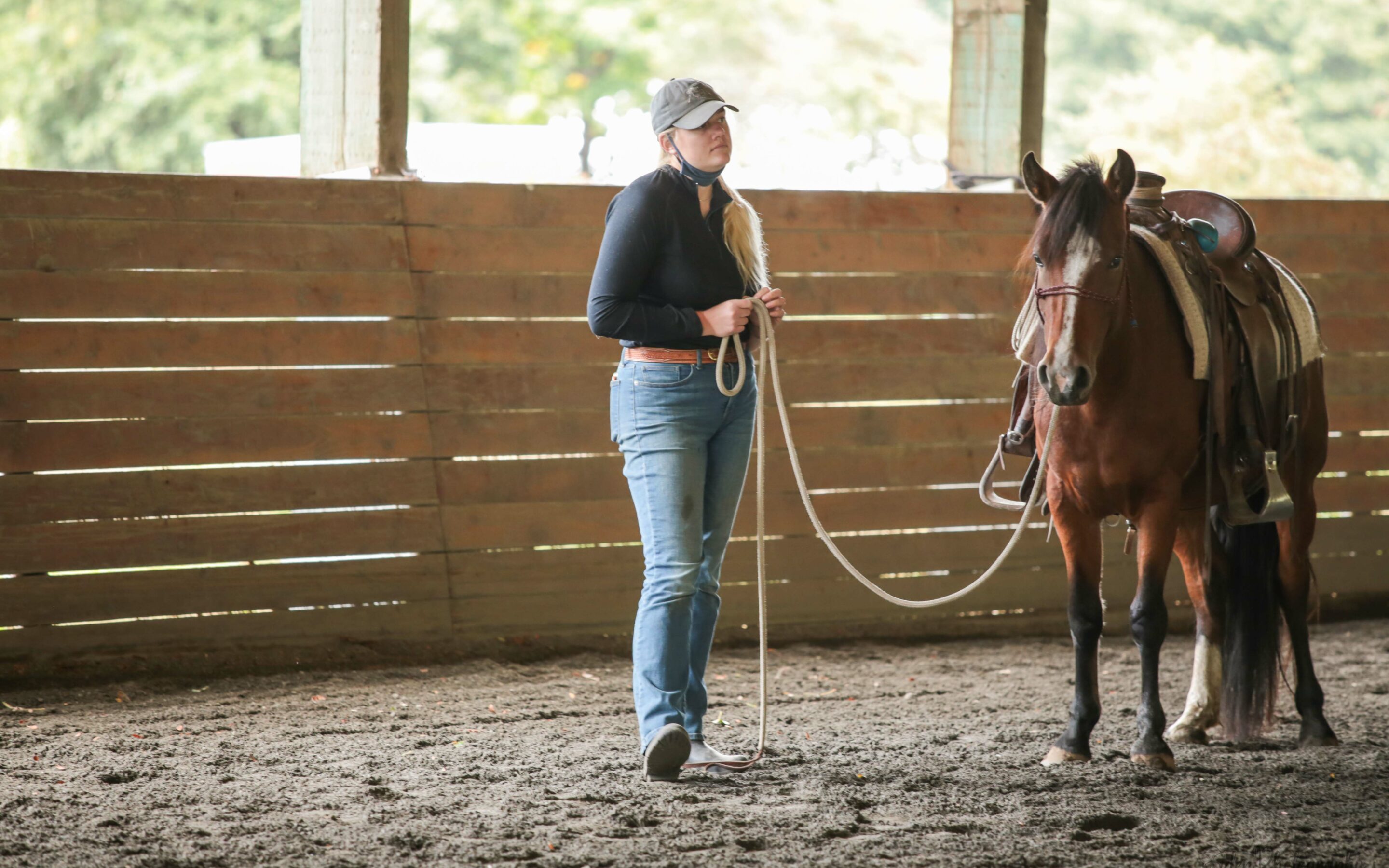
Joel Conner Clinic Report: Pepper
During the September Joel Conner clinic, Pepper got a lot of work on her education! Lily L took Pepper in the groundwork class and had this to say about the experience:
I had the honor of working alongside Pepper at the most recent Joel clinic, which was a tremendous experience. Pepper is a wonderful partner with a lot of try. She is also a very intelligent mare, and certainly challenged me in a good way.
She is well-versed in the basics, although struggles a bit with front quarters. We worked a lot over the weekend with driving her front across, as she is liable to not reach far enough, which resulted in a few collisions and near-misses (I did backbend away from her oncoming head matrix-style several times, for better or worse). Her build does not lend itself to being particularly well-balanced, so I feel that she struggles a bit more with executing the basics even when she is properly asked. Another indication of her lack of balance came when I asked her to stop in a bend, which she struggled to do comfortably. We also worked on getting her to move away from me, in both the unified circle but especially in hindquarters, where she had a tendency to drop her shoulder towards me. I found that firming up worked (as it always does!) to set the boundary that my space is my space.
An exercise that Pepper did rather well at was backing circles, where she was very soft. Not very balanced, but soft. Overall, I was so very grateful to be granted the opportunity to work with such a willing partner (not to mention very cute!)
Here are more photos from Pepper’s sessions in the clinic. Joel put some rides on her, and she did quite well!
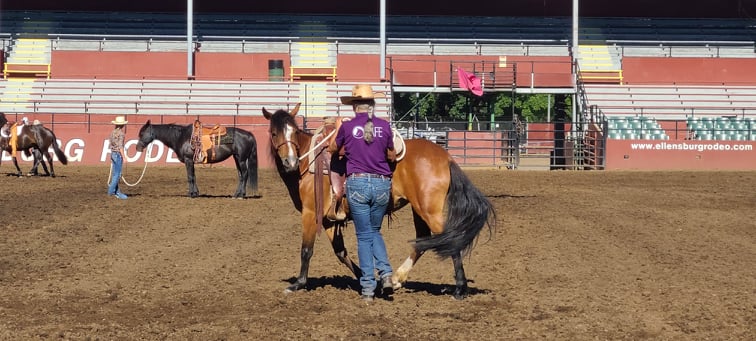
Pepper at the Buck Brannaman Clinic
In July, the staff and a few volunteer riders took five SAFE horses to the Buck Brannaman Clinic in Ellensburg. Phoebe worked with Pepper and here is what she had to say:
The 2021 Ellensburg Buck clinic was Pepper’s first trip away from SAFE. She handled all the unknowns, new sights, sounds and smells with surprising calmness. She impressed me with her questions, and her willingness to learn once she understood what was being asked of her. Despite the distractions of all the other horses in the arena, she was able to stay focused on the job at hand and was easy to refocus her if her attention wandered. She was a delight to work with!
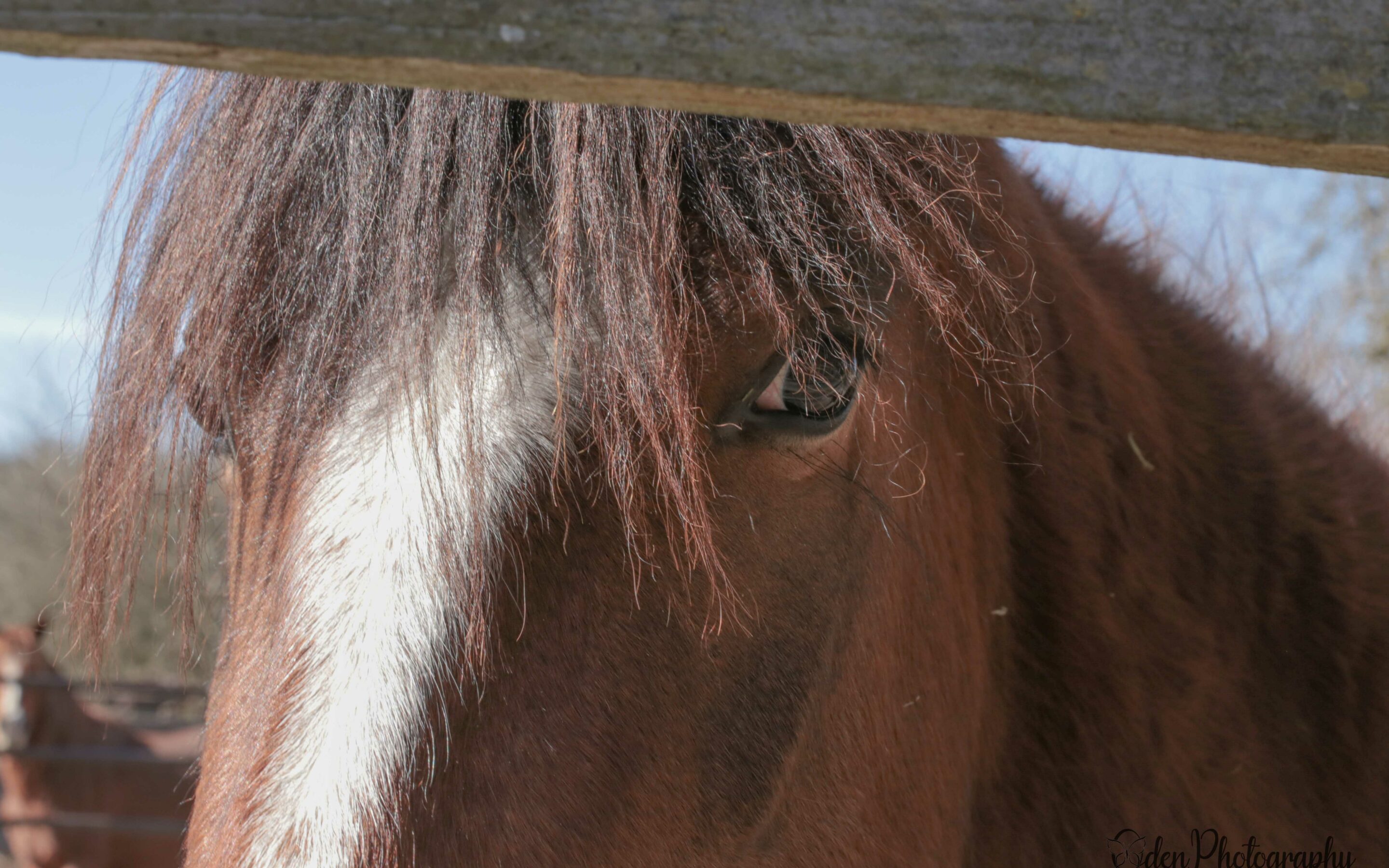
Pepper Has Been Saddled!
Pepper has achieved a training milestone: she wore a saddle for the first time! We’ll be spending plenty of time getting her comfortable with the saddle before we introduce a rider, but so far, so good! Because of an atrophied muscle in Pepper’s right hip and a somewhat crooked limb, Pepper will not be a vigorous riding horse but is expected to be suited as an easy-going riding horse.
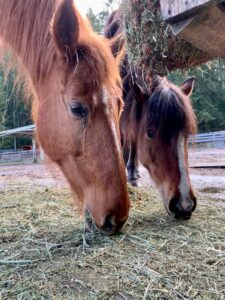
Sienna and Pepper, best friends from the start!
Pepper’s paddock buddies are Sienna and Veronica. Sienna can be a bit of a boss and very picky about her herd mates, so we introduced Pepper to her first. Sienna was immediately in love with her newest friend, sharing hay from the same hay net without hesitation. It took her a little bit more time with Veronica, but it worked out. Both Pepper and Veronica were part of the Fall City 40 and had a lot of experience with herd dynamics, so we thought they would be a great fit for our very particular mare, Sienna. Turns out we were right and the three are now best friends.
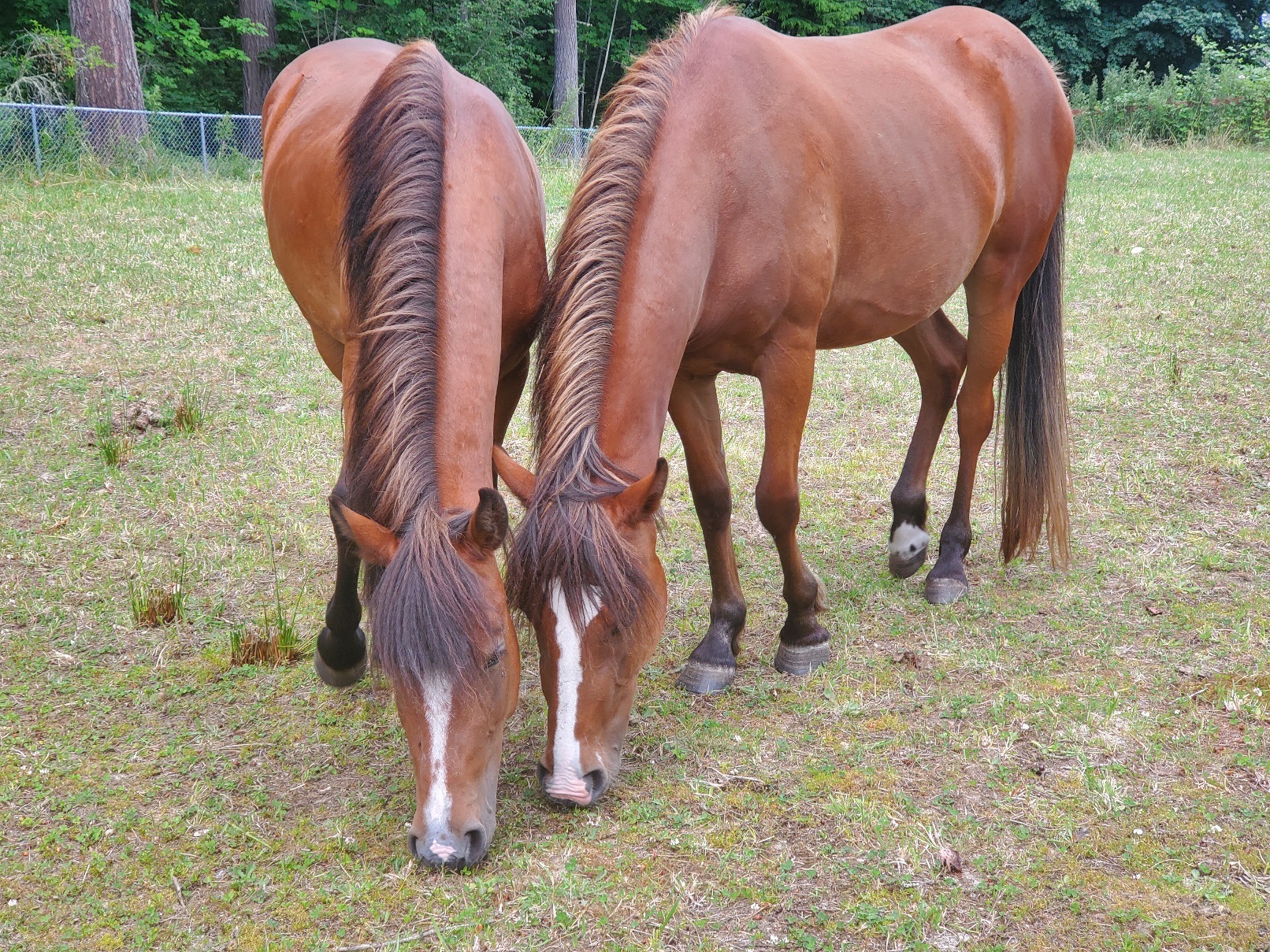
Greetings from Gig Harbor!
Pepper and Tilt have been spending time in Gig Harbor with a wonderful foster family. Lisa Garr, one of our volunteer riders, lives in Gig Harbor and stops by the foster family’s home to work with the two mares. Here’s what she recently had to say about their progress:
“While I have had very limited opportunities to get out to work with Pepper and Tilt since October, the time that their foster family has been putting into gentling and socializing these two girls is really paying off!
I’ve been out a few times in the last couple of weeks, working primarily on approaching and haltering Tilt, and the changes from the fall are extraordinary! Whereas it used to be a 5 to 10 minute game of facing up and allowing an approach, she is now exceptionally willing to hook on, allow me to approach, give her some halter-free affection, and slip the halter on. After two days of playing a little catch and release, she stayed with me and allowed me to rub the halter and rope all over her (without it on), including over her back, under her chin, and on the off side. Something that was a hard not even 3 months ago!
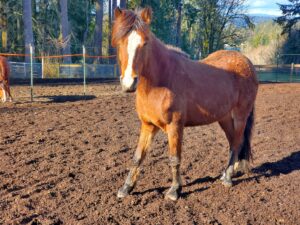 Pepper continues to be sweet, gentle, curious, and brave. Her foster family is quite new to caring for and working with horses, so unfortunately she has gotten a little pushy with her curious little mouth. But a couple of firm and respectful corrections had her remembering her good ground manners, and with a bit more consistency she’ll be a little lady once again. Pepper continues to get small lessons in understanding the flag, ropes, and burlap sacks in preparation for her future saddling.
Pepper continues to be sweet, gentle, curious, and brave. Her foster family is quite new to caring for and working with horses, so unfortunately she has gotten a little pushy with her curious little mouth. But a couple of firm and respectful corrections had her remembering her good ground manners, and with a bit more consistency she’ll be a little lady once again. Pepper continues to get small lessons in understanding the flag, ropes, and burlap sacks in preparation for her future saddling.
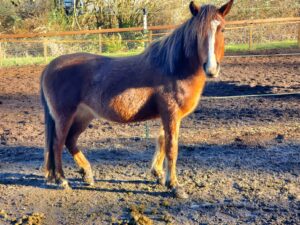 Tilt has excellent ground manners and is progressing nicely with some basic groundwork to help free her feet and find balance. Due to lack of experience and therefore confidence in the foster family, I redirected my limited time to work on catching her so they could halter and groom her more regularly.
Tilt has excellent ground manners and is progressing nicely with some basic groundwork to help free her feet and find balance. Due to lack of experience and therefore confidence in the foster family, I redirected my limited time to work on catching her so they could halter and groom her more regularly.
Both Pepper and Tilt are lovely for the farrier and love a good “spa day” where we just take some good time to curry them, give good scratches, and brush out their INSANELY THICK AND GORGEOUS manes and tails. These girls are not for the grooming-faint-of-heart!”
Pepper and Tilt will soon be making their way back to Safe Harbor Stables, where Pepper will join our horsemanship program and Tilt may be on her way to being adopted!
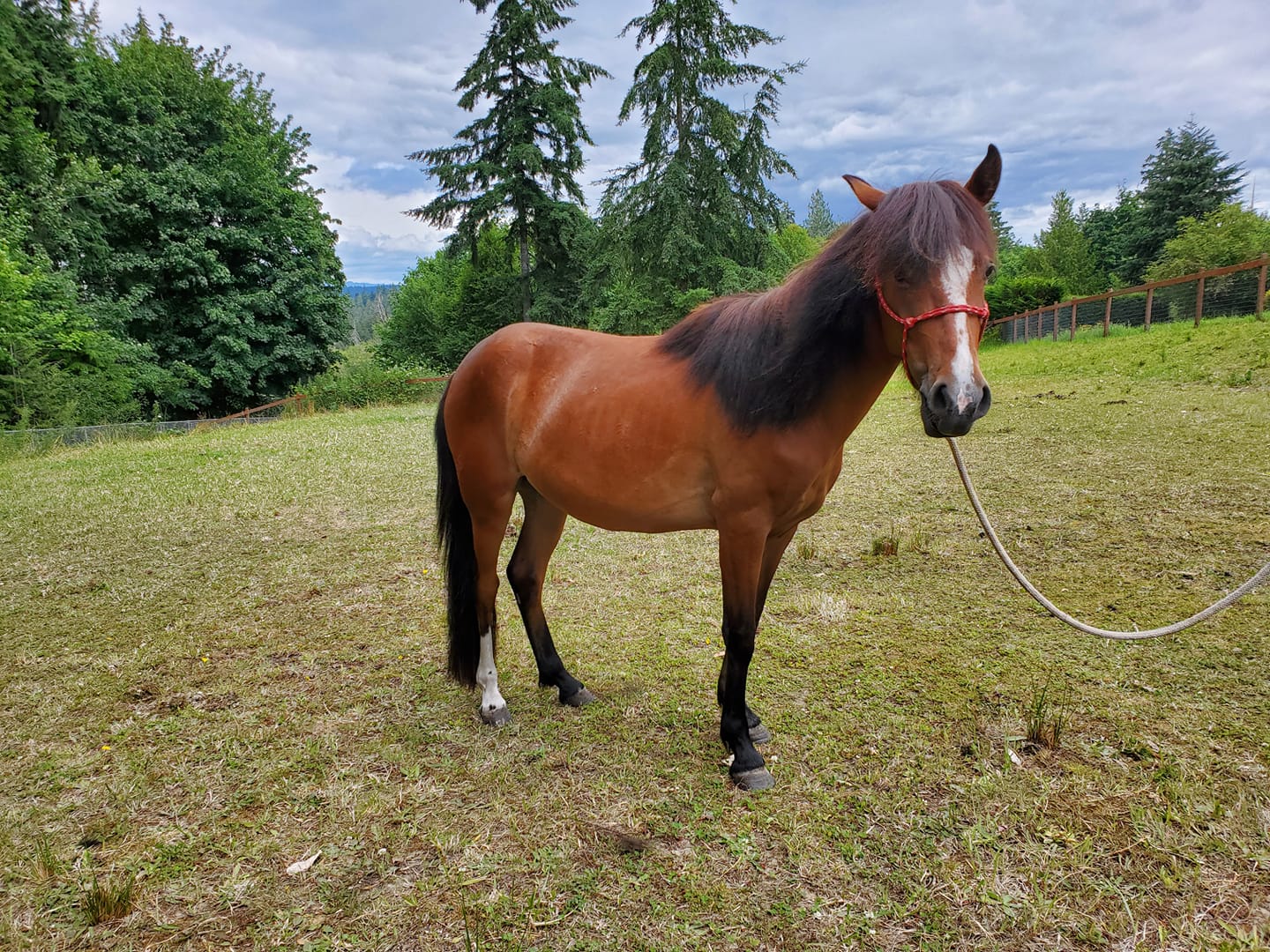
Pepper’s New Foster Home
We’ve heard from Pepper’s new foster home–she’s settled right in and is happy to kick up her heels with Tilt! Both of these girls are coming along beautifully and are ready to find their forever families.
Pepper has settled into her new foster home beautifully (with Tilt to keep her company!). She walks right up to whomever comes out to the paddock to visit or work, and will give a sniff and accept a pet every time. Pepper, even though very green, is exhibiting a wonderful, patient personality in teaching her (very new to horse care) Foster Family how to halter, groom, and lead a horse. This little filly is a sweetheart, but has a certain streak of sass; you can clearly see it in the way that she tosses her head and shows off her gorgeous, thick mane!
We are working on some slightly more advanced groundwork, using the lass rope in the early steps in preparing for saddling and doing a good bit of conditioning work now that she is healthy, inside and out.
Pepper loves to be groomed and have the attention and affection poured on! She has been good for the vet, was a champ for the farrier, is very gentle about having her feet handled.
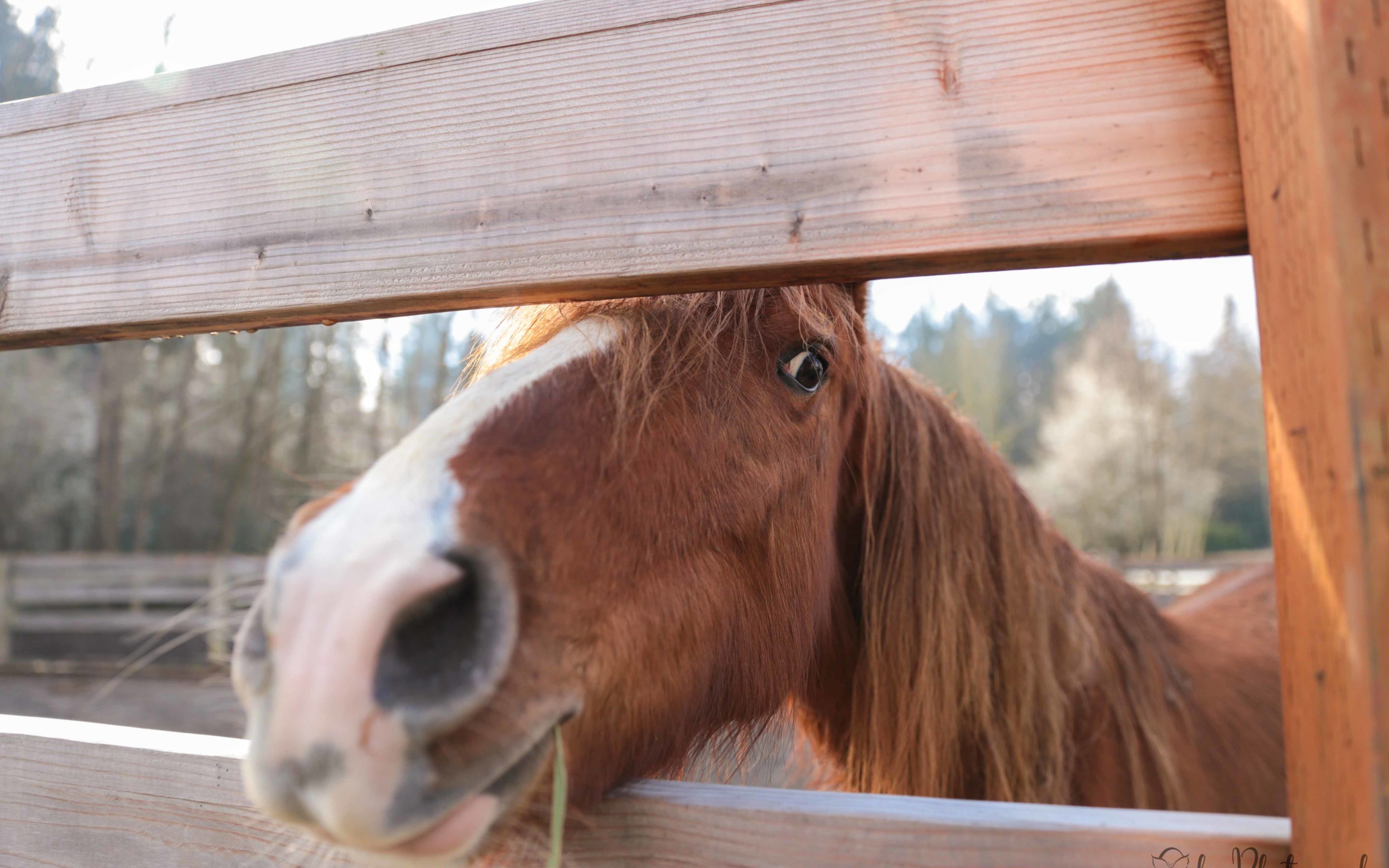
Fall City 40 Update
We started back in June with 40 horses…and we could not be happier that 30 of those horses are now in new homes, getting the care they need and deserve. That leaves ten horses who still need homes. You’ll notice that on the last update, we said that 11 horses are still available…things have REALLY slowed down with placing these horses. A couple adoptions fell through…the weather got ugly…and the public’s attention turned to other matters. Of course we knew we were in this for the long haul, but it’s been a while since we’ve even seen a good application for one of these horses. We’re really hoping that things will start to pick up now that the days are getting longer again. These horses are ready to start their new lives; are you ready to take one on?
For more on the Fall City 40, visit mayday.safehorses.org
Meet Pepper!
Meet Pepper, formerly known as Filly #125!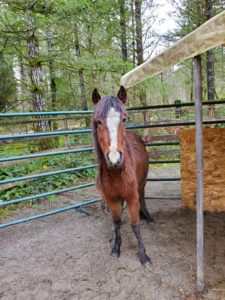
This little one is proving to be brave, smart, and kind… with a good stubborn streak in there as well! Pepper likes her living area (a three sided shelter with mats), keeps it quite tidy, and has decided that her Timothy hay makes a better bed than dinner…and that yummy Alfalfa is far preferable to boring old Tim!!!
Due a LOT to the weather the past few weeks (but also, life.), our time has been much more limited than I would have liked, but this little one is making some lovely progress! She is learning how to lead with a lass rope, and has accepted and seeks out scratches on her face and shoulders, but is still not so sure about having a human hand on both sides of her neck at once. She is also very wary of things passing beneath her chin (as are most horses!), so we are doing a lot of halter prep work with the lass rope at this time. She’s doing hindquarter/ frontquarters and changing of eyes beautifully and leading all around her shelter with the lass.
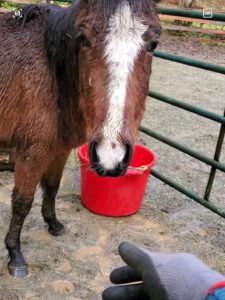 Pepper has had the rope all over her body, around her legs and rump, and under her belly – and has accepted it all with style! A couple of half-hearted kicks the first few times it went around her rump, but nothing vicious; just trying to figure out if that would get rid of it.
Pepper has had the rope all over her body, around her legs and rump, and under her belly – and has accepted it all with style! A couple of half-hearted kicks the first few times it went around her rump, but nothing vicious; just trying to figure out if that would get rid of it.
Pepper pops right over to the fence when I come down for a hello sniff and scratch, and during work sessions she’s had some BIG releases in the lasso work that ended in a series of HUGE eye-rolling yawns; after which she’ll approach me to snuffle my ears and hair and stand hip-shot with me for several minutes – it is SO STINKING CUTE!
Excited for this little one’s future and progress!! Please fill out an application to adopt her today!
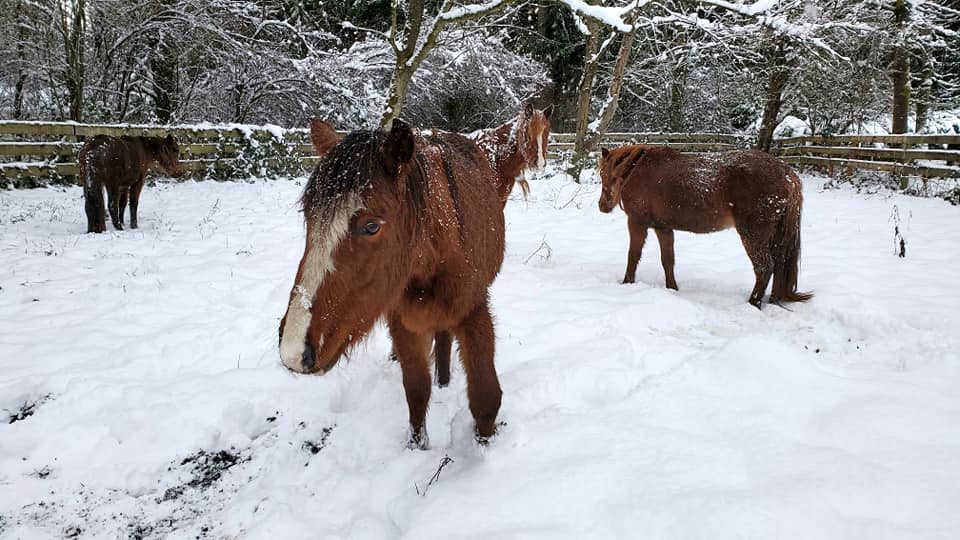
Fall City 40 Horses Update
If we’re being completely honest, taking on 24 wild horses in the dead of winter seemed like an impossible task, even to us. But we have successfully placed 11 of the seized horses into good homes with experiences handlers, and two more leave this week. That leaves 11 horses that are still available for adoption. Six of these horses are in foster homes where they are being handled, gentled, and halter-started. The other five are now at SAFE. We have handsome stallion Arty Shaw, and a group of four fillies. All five are getting accustomed to the presence of humans. They’re shy, but we’re encouraged to see that all of them are curious and interested in interacting with us. We’ve also noticed something wonderful: now that the four young mares do not have to worry about getting enough to eat, they spend time together playing like little kids. Here are some videos we captured during the recent snow:
Homes for the remaining 11 horses are still needed. If you have experience with unhandled, wild horses, please consider giving one of these beauties a home! Submit an adoption application here Adoption Application
Fall City 40 Update
It’s been about a month since the remaining Fall City 40 horses were seized in Enumclaw. These 24 horses have all been signed over to SAFE now, so we have full responsibility for their housing, feeding, and vet care, and we are taking steps to find homes for as many of them as possible. We are so grateful for the support we are receiving from this community to help us manage this huge rescue effort! It’s a lot of work, but with your help, we are making big changes for these horses!
Keep up to date with the horses at their website: http://mayday.safehorses.org
With regular feeding, the horses are starting to look and feel a lot better. There are some really nice looking horses in this group with cute markings and decent conformation. We’ve even discovered some unexpected athletic ability (like jumping!) in one or two of them. Most of them at least seem open to the idea of sharing the world with humans, and are becoming more gentle already. Wild horses are a challenge, to be sure, but most of these horses were born into this herd, not in the wild, but not exactly in captivity either. So we hope the young ones especially will make an easier transition from wild to domesticated.
As of this moment, six of the 24 horses — four mares and two colts — have been moved to new homes. Several of the remaining horses are in the process of being sent to foster care with experienced trainers for gentling, which will make them much easier and safer to place into adopt. All of the stallions will soon be gelded, and we’re finding adopters who can take in mares who are likely to be pregnant. Progress is being made.
But this is a tough time of year to be placing horses, and these are horses who are especially tricky to place. So we still need our community’s help with this rescue effort. Specifically, what we need includes:
• adopters who have experience with wild, unhandled horses
• trainers willing to foster and gentle one of these horses so we can place them more easily
• donations for the considerable cost for care, feeding, housing, vet costs, and transport of these horses
• people keeping an eye out for the missing mare, stolen by the owner, and for other groups of horses possibly owned by the same individual
We’ve also received some questions about the group of horses located in Auburn WA that were owned by the same person who owned the Fall City Forty. Those horses, about 50 in all, now belong to the owner of the Auburn property, and she is offering them for sale at $800 per horse to try to recoup her losses. There are several ponies, mini horses, and foals in this group, several colored horses as well. We believe that these horses came from feedlots and auction houses, so they are not wild horses. But they have not received much handling in the last year, so they will still need gentling and training. If you are interested in buying one of these horses, contact Dee Bowman at BnGRanchLLC@gmail.com SAFE has offered to cover the cost of gelding any of the stallions in this herd on behalf of their new owners.
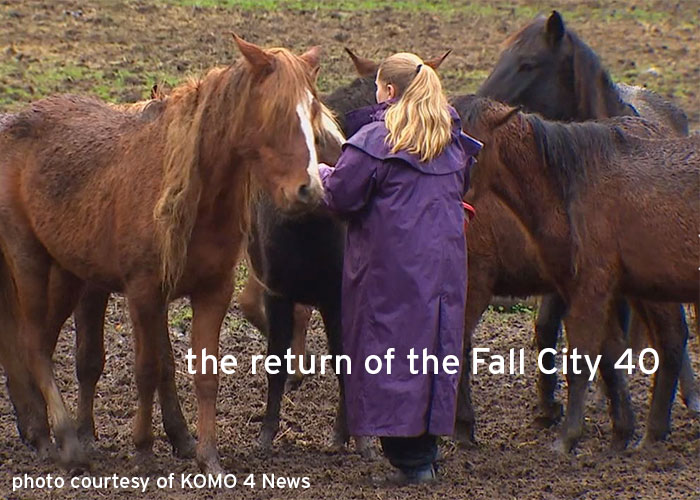
Horses Rescued in Enumclaw
Answers to FAQs
• yes, these are the horses we called the Fall City 40
• these horses are in a secure location, with food, water, and shelter
• these horses are in sheriff’s custody now, but will be signed over to SAFE soon
• SAFE is covering the cost of their board, feed, and vet care with money raised for the Fall City 40
• these horses will be available for adoption to people who have experience with unhandled horses
• stallions will be gelded prior to adoption and adopters will be responsible for after care
• visit http://mayday.safehorses.org for further updates
As was reported on several local news outlets over the weekend, SAFE was involved in a large seizure of horses by the King County Sheriff’s Office. At this time, all we can say is that the horses are in a safe and secure location with food, water, and shelter, and that they will be held there pending this active cruelty investigation. SAFE has taken on responsibility for the cost of their shelter, feeding, and vet needs, and is covering those costs with funds raised during the summer for the rescue of the Fall City Forty. We are accepting donations to our general fund for ongoing needs of all the horses in our care. We thank you sincerely for your support with this operation and your sincere concern about the well-being of these animals.
If you know the location of any other horses belonging to the individual mentioned in the news stories below, please contact us immediately, and we will pass that information on to the King County Sheriff. It’s vitally important that any remaining horses belonging to this person are tracked down and accounted for. Thank you for your help with this effort!
More information on this case:
KIRO TV story: https://www.kiro7.com/video/?id=4802680
KING TV story: https://www.king5.com/article/news/local/king-county-horses-rescued-enumclaw/281-c4c10b75-cdba-4d28-bf0a-db34d75a1176
KOMO TV story: https://komonews.com/news/local/22-horses-seized-as-king-co-investigates-nonprofit-for-animal-cruelty
Q13 TV story: https://q13fox.com/2019/12/09/22-horses-rescued-from-horrid-living-conditions-in-enumclaw/
Redmond Reporter: More than 100 horses are being hoarded by a nonprofit in Puget Sound
Placeholder
Redmond Reporter: More than 100 horses are being hoarded by a nonprofit in Puget Sound
Under guise of nonprofit caring for rescued horses, allegations of animal cruelty arose.
By Aaron Kunkler and Ashley Hiruko
Friday, September 6, 2019 8:30am
No one really knows how many horses Sharon Hunter has. Hunter, who owns and operates the Hunters Wind Wild Horse Rescue, had as many as 120 horses in two separate herds at one time. She stowed them on properties in Puget Sound counties.
Hunter’s Redmond-based nonprofit was founded in 2015, with just more than a dozen rescued horses from the Yakama Nation reservation in Eastern Washington. Since then, several of her horses have been seized by authorities alleging neglect in three counties, and in two counties horses have been euthanized. Horse advocates believe she may have more.
The nonprofit’s impact can be felt beyond the mossy pastures of King, Snohomish and Pierce counties. It stretches across the country to horse rescues in the Louisiana flatlands and in the dusty kill pens of Texas — the last stop for unwanted horses before slaughter.
Whether Hunter’s nonprofit is a net positive depends on who you ask.
(When contacted by phone for this story, Hunter hung up. She did not answer a follow-up phone call and an email received no reply. The civil attorney representing Hunter has not returned a request for comment as of the Reporter’s deadline.)
A Good Start
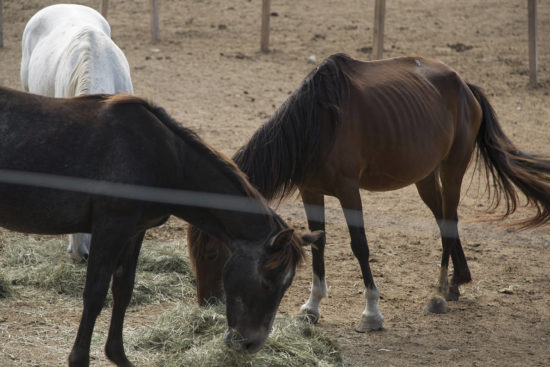
One of Hunter’s herds, located in King County, is fed a batch of hay. Horses, like these, are being housed on properties in numerous counties. Landowners allege that their owner hasn’t provided enough food or medical attention. Ashley Hiruko/staff photo
Hunter originally appeared in pages of the Redmond Reporter in 2015, when she started rescuing horses with her daughter Brandelyn and her son-in-law Joe Tafoya. Hunter’s family had been rescuing horses for about two decades and in 2015, Hunter took in 13 wild horses from the Yakama Nation reservation.
Before they were rescued, the horses were slated to be shipped abroad — either to Canada or Mexico — and slaughtered for their meat, Hunter said. And the conditions the horses faced in the industry’s kill pens were horrific. While Hunter was originally planning to take in two horses, she ended up rescuing 13.
The horses arrived in generally poor shape, and the family said they provided medical care. Two mares arrived pregnant, but one of the colts didn’t survive. It had been born with too many health problems, Hunter said.
“He had lots of love,” she said in 2015. “We named him Black Beauty.”
Hunter’s plan at the time was to rescue, rehabilitate and release the horses. She said she was working on securing a 14,000-acre plot of land in Oregon for a horse sanctuary. Joe Tafoya was trying to get Washington state to permenantly end horse slaughter and close the kill pen industry pipelines.
But at some point in the last four years, the relationship between the Tafoyas and Hunter soured and the herd multiplied. Joe Tafoya said he and his wife no longer have regular contact with Hunter.
“My wife and I continue to rescue horses on our own privately. When [the Reporter published] the article, Sharon had actually just brought those 13 horses on my property and we were trying to get involved to help. Shortly after, we figured out that we wouldn’t be able to help or work with her,” Joe Tafoya said in an email.
By 2019, Hunter’s herd had swelled in size to at least 120, with known herds at a spot in Snohomish County and one in Auburn. Another was in Fall City this summer, before being relocated to Enumclaw. At least one cluster was in Pierce County. Court documents from King and Snohomish counties indicate that several of the horses also were purchased from kill pens before they could be slaughtered abroad.
Kill Pens
Far from the Pacific Northwest, Angels Grove Ranch sits in the wooded southeast of Louisiana — about an hour’s drive north of New Orleans, across the Lake Pontchartrain Causeway. Court documents show that Hunter had boarded 10 horses with Lisa Massimini’s Angels Grove Ranch and Horse Rescue.
Massimini said horses she boarded, belonging to Hunter, were brought over by someone previously boarding them in Texas.
An investigation report from King County stated that a detective contacted Massimini, who said Hunter had made a down payment for boarding and care of the horses in August 2017. Between that time and the end of January 2018, she said she hadn’t received any additional payments during the five months of care. Eventually, Hunter paid the boarding fees and the horses were picked up by a hauler from her Louisiana ranch.
“I don’t really know where they went after me,” Massimini said.
Several of Hunter’s horses originally came from the south, and in particular Louisiana and Texas. Both states have notable horse kill pens that funnel horses to be slaughtered abroad. The U.S. essentially outlawed the practice of slaughtering horses about 12 years ago when the U.S. Department of Agriculture’s annual funding to inspect domestic horse slaughter facilities was cut. The soft ban requires annual approval from Congress, which has been renewed each year except two.
The soft ban basically prohibits the USDA from inspecting horse processing plants, and meat can’t cross state lines without the inspections. But instead of ending horse slaughter, it simply created an industry known as kill buying — where buyers pick up unwanted horses and ship them to either Canada or Mexico. Across the border, they are slaughtered for meat.
Many of Hunter’s horses may have been bought with the intention of saving them from kill buyers, including the ones Hunter seemed to have purchased and then boarded at Massimini’s rescue. Snohomish County court documents list some of Hunter’s horses as coming from Bastrop, Louisiana, home to what Massimini called a notable kill lot.
“Really if you want to dig deep … It’s people like Sharon that are trying to get horses so they don’t cross the border and they don’t die,’” Massimini said.
However, Massimini said she was unaware of what Hunter did with the horses in Washington state, or how the herd Massimini boarded was treated when they left her care.
Craig Downer runs The Wild Horse Conspiracy, a Nevada-based organization focused on preserving wild American horse lineages. Downer wrote a message in support of Hunters Wind Wild Horse Rescue on Facebook, which was shared by the rescue.
When contacted by the Reporter, Downer said he hadn’t seen the herd in person, but was particularly interested in the Yakima horse lineage. Proper breeding, he said, was essential to preserve the herd’s genetics. Downer said he learned of Hunter’s rescue after she reached out to him on social media some years ago.
“I don’t claim to really know for sure,” Downer said. “Her heart seemed to be really for the horses… that was like No. 1, and (she was) willing to sacrifice her own comforts and money and everything to help these horses. I do believe that.”
The Humane Society tracks horses that pass through kill pens to be slaughtered abroad. In 2018, about 80,000 horses met that fate, with most heading to Mexico, said spokesperson Keith Dane. A horse can fetch some money, but mostly nets less than $1,000 a head from a slaughterhouse.
Kill pen operators often market the horses to concerned horse owners and rescues before shipping them off. Kill pen operators give people an ultimatum: buy the horse or let it get packed onto a crowded truck and slaughtered abroad for a profit.
While the low price for a horse sent to slaughter means it’s not a terribly lucrative industry, about a dozen large operations exist, Dane said. Smaller operators are working across the country too.
“The Midwest is sort of like the epicenter of where these kill pens are located,” he said.
The Humane Society supports the Safeguard American Food Exports Act, which if passed by Congress, would permanently outlaw horse slaughter in the United States and prohibit shipping horses abroad to be slaughtered. Dane argued that horses currently slated for slaughter could find homes in the United States. Dane points to the fact that in 2012, about 160,000 horses were being shipped to slaughter, twice as many as last year. If the United States could handle those 80,000 horses, it could provide for the other half, he said.
Other groups, such as the Animal Welfare Council, have penned opinion pieces questioning whether laws like the Safeguard American Food Exports Act would help.
“Surely swift humane euthanasia at a [government] regulated and inspected processing plant is a kinder end than starving to death,” the council wrote on its website.
It’s worth noting, however, that both Massimini and Downer said they were unaware of the felony animal cruelty charges Hunter is facing in King and Snohomish counties (as many as 10 charges). Pierce County also has an active investigation looking into Hunter.
Abuse Allegations
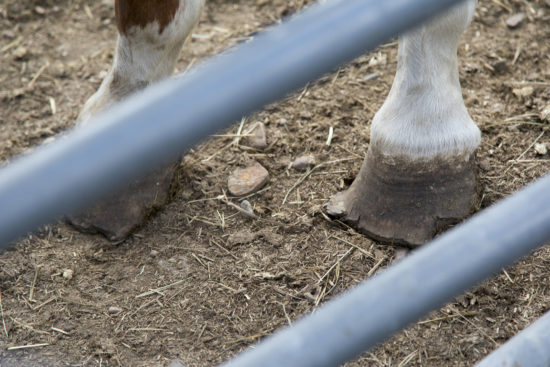
Horse hooves need to be trimmed on a regular basis and is a major task involved with horse management. Improper management of a horse’s hooves can lead to lameness. Ashley Hiruko/staff photo
On Feb. 5, 2018, Snohomish County Animal Services received a complaint about six troubled horses located on a property off of 153rd Avenue Southeast, about halfway between Maltby and Duvall. The report was made by the daughter of landowners who said they were approached by Hunter to board and lease at their pasture and barn. At first, two miniature horses and two full-size horses were brought to the property in January 2018.
The landowner had concerns about the animals’ health and asked Hunter to have a veterinarian visit. Court documents allege Hunter failed to do so. Animal control services obtained a search warrant, which allowed a veterinarian to examine the then six horses alongside law enforcement.
One pony named Lil Patches was found lying in his own feces and urine, unable to stand. The black-and-white pony was severely underweight and had chronic, untreated laminitis (an inflammation of the foot). The pony only stood on his own after receiving pain medicine.
Snohomish County seized Lil Patches, along with Miracle, a quarter horse mare with an untreated old wound that developed excessive tissue and blood vessels. Authorities also took Goldie, a palomino mare who was also severely underweight. It appeared Goldie was anemic and had a skin infection covering her entire body. These horses needed immediate medical attention, according to Snohomish County District Court documents.
The other three horses — Warrior, Willow and Princess — were in somewhat better shape and stayed on the property.
Snohomish County Animal Services manager Debby Zins said one horse was euthanized because of her condition. Another of the seized horses was initially rehabilitated and adopted out, but wound up being euthanized too. Only the third seized horse is still alive.
After the Snohomish County action, Hunter disappeared with her remaining three horses, moving them off the property to an unknown location, Zins said. The Snohomish County horses were originally moved to the 153rd Avenue site to avoid scrutiny from King County law enforcement, following a civil citation for animal cruelty, she added.
“We encourage anyone who knows where she is keeping horses, or if anyone has any of her horses or is concerned for her horses’ care, to please reach out to their local animal control agency,” Zins wrote in an email.
Later that month, Hunter was charged with six counts of second-degree animal cruelty in Snohomish County. If convicted, the felony counts would bar her from owning horses for a length of time determined by a judge. Her trial is scheduled for this month, but a continuance is possible.
Zins said she believes Hunter’s horse-centered nonprofit doesn’t function like others, in which horses are rehabilitated and then adopted out. Zins is only aware of Hunter collecting horses.
“Sharon Hunter is horse hoarding. Hoarding cases are complex and it is very difficult to break that cycle. She appears to be dedicated to her purpose, but is ill equipped to care for the animals and as a result many horses are neglected and suffering,” Zins wrote.
King and Pierce County Horses
Tim Anderson, lead animal control sergeant for Regional Animal Services of King County (RASKC), has been investigating Hunter’s Auburn herd of about 80 animals. The herd is in addition to another, known as the Fall City 40, which was moved to Enumclaw, and the Snohomish herd.
On Aug. 2, King County investigators moved in to inspect the Auburn herd, housed on a roughly 17-acre property. Four horses were ultimately seized.
Following that, Anderson said four civil notices of violation were issued on Aug. 17 for $500 each. The citations acted as the basis of four counts of second-degree animal cruelty charges recommended to the King County Prosecuting Attorney’s office on Sept. 1, Anderson said. However, the Reporter was not able to confirm those charges at the time of publication with the county prosecutor. If the charges are confirmed, it would bring the total number of felony charges Hunter is facing to 10.
In addition, Anderson said, a separate notice King County served Hunter on Aug. 17 would bar her from possessing horses within county lines for four years. She has about a month to comply or appeal. If not, Hunter could be fined $1,000 per day, per horse that is found in King County.
“She certainly has a lot of horses, more horses than she appears to be able to care for,” Anderson said.
The Auburn herd has dwindled to 65 from its peak of 80 after RASKC seized several horses and others were relocated to other properties. One of the horses was euthanized.
The pastures of the Auburn property have turned to dirt, due to the 65 horses housed on about 17 acres. Horses generally require between one to two acres per animal, according to Stable Management, an equine professional resource.
At the Auburn site, the horses are separated by sex and type, and within the last few weeks the property owner has begun supplementing and eventually fully feeding the horses. Many of the horses have cracked or chipped hooves and are in need of farrier services, dental work, de-worming and general vet care.
The Auburn property owner, who asked to remain anonymous due to fears of compromising ongoing legal matters, said Hunter had originally asked to pay rent and board for 12 horses on the property during spring 2018, a number that steadily ballooned to more than 80 by earlier this year. She said Hunter has intermittently provided the horses with food, but not enough to fully feed the large herd. Little headway has been made on relocating the horses, the property owner added.
“She has not adopted one horse out during the whole time,” she said. “When she starts getting in trouble she starts moving them around.”
Bonnie Hammond, executive director of the Redmond-based nonprofit Save A Forgotten Equine (SAFE), said they were willing to step in if the horses were declared abandoned, following a 15-day waiting period. However, on Sept. 3, the property owner said that Hunter was planning on removing the horses over the following days. During a phone interview with the property owner on Sept. 3, more King County animal control officers were onsite inspecting another horse that appeared malnourished.
While they can inspect, there’s little animal control can do under existing state or local laws to prevent someone from owning an abundance of horses. Law enforcement can only get involved when there are reports of animal cruelty or neglect, as animal control agencies in King, Snohomish and Pierce counties allege is the case with Hunter.
Owning too many horses comes with financial and time burdens. For example, SAFE’s program only accepts 30 horses at a time. And to care for that many horses the nonprofit requires 140 volunteers, five paid staff and a budget of about $650,000 each year, Hammond said.
SAFE has been involved in stepping in to care for several of Hunter’s herds, including the one in Auburn.
“Horses are hard to take care of and you need a lot of people, a lot of money, a lot of resources to properly take care of large groups of horses,” Hammond said.
In Pierce County, Animal Control supervisor Brian Boman said four horses were seized. Details are scarce during the ongoing investigation, but they are also Hunter’s horses.
Fall City 40
The Fall City 40 herd grew from the group of 13 wild horses previously housed just east of Redmond in 2015. At some point afterward, the horses relocated to the Johann family property in Fall City, a small town west of Snoqualmie. Jamie Johann-Barney is the daughter of the aging property owners, and said Hunter initially approached them by walking up their driveway and asking if they could board horses there.
Johann-Barney said the horses weren’t properly cared for and says her parents lost significant amounts of money boarding the horses. In June, she and others staged what Johann-Barney called an intervention, asking her father to get rid of the horses.
Law enforcement wouldn’t intervene, she said. Officers told them that since the family initially agreed to board the horses without a contract, it was a civil matter. SAFE, which later got involved, said the horses were allowed to breed freely, were not being fed, not receiving veterinarian or farrier care and not being adopted out.
“It was horrible,” Johann-Barney said.
According to SAFE’s website, the Johanns wanted the horses gone, but Hunter wouldn’t remove them. The Johanns sent a notice to Hunter in June saying she had 15 days to remove the horses or they would be considered abandoned. When the horses weren’t removed, the Johanns contacted SAFE, which helped get the horses healthy and assisted in their adoption.
The nonprofit provided hay, photographed and cataloged the herd, and tried to attract adopters, according to a post on the organization’s website that was also confirmed by Hammond.
Of the 40 horses, 15 were adopted out to new owners. But then an attorney representing Hunter served the Johanns with a cease and desist letter, demanding they stop trying to adopt out the horses. Hunter was also seeking to reclaim the horses in the letter. In the face of a possible lawsuit, the property owners decided to let Hunter remove the remaining 25 horses. Hunter also sent SAFE a similar letter demanding the 15 horses back that had been adopted. SAFE declined.
The remaining 25 from the herd were moved to another location, likely in Enumclaw, Hammond said.
“The truth is that she’s got groups of horses that she’s just shuffling from one place to another. Either she gets thrown off a property, or law enforcement’s getting too close or what have you,” Hammond said. “She’ll tell stories about saving America’s wild horses and all this really romantic stuff. But in truth, she’s just stockpiling them and they sit and they fight with each other and the stallions breed with the mares.”
Hammond was clear in what she would like to see happen.
“I would like her to stop acquiring horses,” Hammond said. “She needs to stop doing this and the scary thing is, there’s still plenty of horses out there. She could get them from the auctions by the truckload.”
A Hard Question
The situation presents a complex question: Is it better to let a horse bound for slaughter to die, or be adopted by individuals or organizations that are not fully equipped to care for the animals?
On the Auction Horses website, a plea is made. The message stands out from the rest of the content. Written in a bold font, in red letters at the top of the website, it reads: “Please NO fundraising for the purchase of horses.”
For Auction Horses, a Washington- and Oregon-based network of people who work to prevent the auction and slaughter of the animals, the message is an important one for the betterment of the animals, advocates say.
“People think, ‘Oh I’d like to give $20 to this good cause’…but if they don’t know where the horse is going and don’t know the person or their resources available to take care of the horses, they have no idea of the kind of situation they’re contributing to,” said Tash Johnson with Auction Horses.
Caring for a horse is a heavy endeavor. Costs are typically in the hundreds per month, and if the animals aren’t fed enough and their feet trimmed every six to eight weeks, horse health can decline.
“If you have 120 horses and you’re trying to feed them and take care of them, it’s an incredibly difficult task,” Johnson said. “Even taking care of them with staff.”
And things can get much worse in the winter, she said, when horses need extra food in order to stay warm and rain turns their pastures into mud pits. Attempting to move large bales of hay — generally 50 and 100 pounds each — becomes difficult in the rain, and hooves not properly cared for can become infected from feces on the ground.
“That’s what happens to neglected horses in Western Washington,” Johnson said.
She learned of Hunter when she relocated some of her horses to Redmond. Johnson’s horses stayed on a property nearby. Johnson said seeing a herd of horses with intact stallions and no separation from mares raised red flags.
When the man whose property Hunter’s horses were staying on started asking for help on the Auction Horses website, the red flags turned into “full-scale alarm,” Johnson said.
But she said having animals shipped off to slaughter is an “absolute failure.”
Johnson has seen every kind of horse end up on feedlots, the final stop before the slaughter: Champion horses sold when the summer ends by owners avoiding financial support during the winter; trail horses; best-of-the-best show horses; brut mares that could no longer get pregnant; ponies and draft horses and even young, healthy horses that went untrained.
She said the best practice for those concerned about the animals’ well being is to prevent them from getting to pens in the first place. Once there, the horses can become injured as they are mingling with dozens of other animals. And illness is brought in from different places. Johnson described the transportation of horses to slaughter, the way they’re handled, loaded into crowded vehicles and the slaughter pipeline as “horrific.”
“Rescue horses from Craigslist or posted on feed boards,” she said. “Save them before the kill pens. Once they’re in the kill pen, if there’s a good home for them, by all means save them. But if there isn’t, honestly, I would rather see them go to slaughter than suffer.”
Link to article online: http://www.redmond-reporter.com/news/more-than-100-horses-are-being-hoarded-by-a-nonprofit-in-puget-sound/
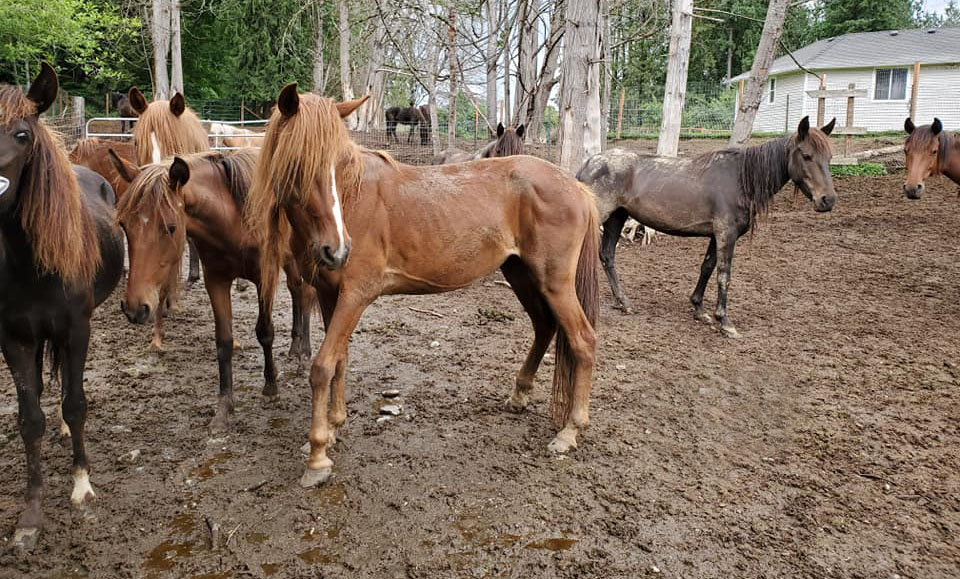
Fall City Forty: the Full Story
We’ve had to stay pretty quiet about the situation with the Fall City Forty for two reasons. One, because we were being threatened with legal action for our involvement in this rescue mission; and two, because we were holding out hope that we would be allowed to return to the Fall City property and continue caring for these horses. We feel it’s time to let our community know what happened, and what is continuing to happen.
First, some background. The horses we called the Fall City Forty were wild horses, originally rescued from Yakima. There were between 14 and 23 horses in the original herd, but because stallions and mares were turned out together and allowed to breed freely, the herd grew in size to the 40 that we encountered last June. While the owners of the Fall City property had originally agreed to let some horses live there temporarily, the situation had grown well out of hand: horses not being fed, not receiving vet or farrier care, not being gentled, handled, or trained, not being adopted to new homes. These horses were just being stockpiled, and all the while their owner was collecting more and more horses from auctions and feedlots.
The property owners wanted the horses gone, but their owner would not remove them. In late June, the property owners had a lawyer send notice to the horses’ owner that they had 15 days for the horses to be removed, after which time they would be considered abandoned under the law. The horses were not removed within the time allowed. The property owners then invited SAFE to come in and assist them in finding new homes for the 40 horses.
On behalf of the property owners, SAFE came in and began working with the horses. We had tons of hay delivered to the property so the horses could be fed 2–3 times per day. We photographed and cataloged the herd, and put the word out that we were looking for people who had experience with unhandled horses who might be willing to adopt them. And we began taking first steps toward gentling these wild animals and helping them become accustomed to being around humans.
Public support for this rescue effort was tremendous. Over 350 people made donations to help these horses and we received adoption applications from more than 40 people. We carefully selected those that that had prior experience working with wild, unhandled horses, and who had the resources necessary to provide regular and sufficient feed, veterinary and farrier care, and training. We conducted phone interviews with candidates to learn more about them and pair them with suitable horses from the herd. We did reference checks with veterinarians, trainers, and personal references. And we evaluated the suitability of new homes with photos and videos taken on site.
One week after we began working with the Fall City horses, a cease and desist letter from an attorney representing the horses’ previous owner was delivered to the property. The letter was addressed to both the property owners and to SAFE, and demanded that we cease our rescue efforts immediately. Because the property owners had taken the necessary steps to establish the herd as abandoned, we were not overly concerned about the cease and desist demands. But for our protection, we hired the same lawyer who drafted the 15 day demand letter for the property owners to represent SAFE, and we continued with our work on their behalf.
The next week, with the help a wonderful group of horsemen and women, we began preparing these horses for the next step in their journey towards better lives. Over the course of two days, 15 of the 40 horses were safely and calmly loaded onto trailers and sent off to new homes. Those who stayed behind continued to be gentled. We began strategizing the best and safest way to geld the many mature stallions who remained. This itself was not an easy problem to solve, but given time, we were confident that these stallions would no longer be capable of bringing more unwanted horses into the world.
It turned out that time was the one thing we no longer had. With the rescue operation in full swing and great progress being made, we were informed that rather than risk a lawsuit, the property owners had decided to try to settle with the horses’ former owner, and allow that individual to take the horses back. Although they were satisfied with the work that SAFE had done and the incredible progress we had made in a very short time, the property owners were no longer willing to fight for the well-being of these horses.
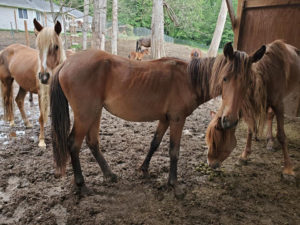 This was a crushing blow. It wasn’t just the work or the money that we put into this rescue effort. We’d come to care a great deal for these horses. We’d gotten to know them, given them names to suit their personalities, and started to earn their trust. We were deeply invested in helping all of them get new homes where they’d no longer go hungry. And we were SO CLOSE. The horses were getting healthy with regular feedings. We were winning the confidence of the shyest among them. We had more approved homes for them to go to, with people who genuinely wanted them. It was all going so well…and then it all came to a crashing halt.
This was a crushing blow. It wasn’t just the work or the money that we put into this rescue effort. We’d come to care a great deal for these horses. We’d gotten to know them, given them names to suit their personalities, and started to earn their trust. We were deeply invested in helping all of them get new homes where they’d no longer go hungry. And we were SO CLOSE. The horses were getting healthy with regular feedings. We were winning the confidence of the shyest among them. We had more approved homes for them to go to, with people who genuinely wanted them. It was all going so well…and then it all came to a crashing halt.
Immediately after the property owners gave up the fight, the attorney representing the horses’ owner came after SAFE, demanding the return of the horses that had been placed on behalf of the property owners and threatening lawsuits against us if we did not comply. We did not comply.
As for the rest of the Fall City horses, we held out hope until the very last minute that somehow we would be allowed back in to help them. But it was not to be. Our attempts to convince the horses’ owner to allow us to find new homes for the Fall City horses were ignored. And last week, their owner was able to move them to a new property. They remain in King County. They’re back to having to rely on their owner for care. Maybe this time things will be different…but based on past history, we remain very concerned about the well-being of these horses, and the many other horses owned by this same individual.
Thanks to the many people who helped with the Fall City Forty, we can take comfort in the fact that 15 of those 40 souls are safe. There is another large group of horses on a property in Auburn belonging to this person and we’re told that they are in the process of being evicted. So if you or someone you know is approached by someone looking for help to quickly move a large group of horses, please feel free to contact us for advice.

